|
The Man Who Lived
on the Fence
|
A
remarkable drama took place in the days preceding the coming battle. There was great
concern over which side the Stanley brothers would fight
on. Considering Thomas Stanley was on
Richard's English Council, it was assumed Lord
Stanley would fight for Richard. If this was
the case, then Richard had nothing to worry about.
And yet Lord Stanley was married to Henry's mother.
Surely Henry had nothing to worry about. But
then again, Lord Stanley had fought on the side of
Richard during Buckingham's Rebellion. Surely
Richard had nothing to worry about. What was
it going to be?
The
problem was that Lord Stanley and his brother
William had well-deserved reputations for being
sneaky. There had been occasions when both men
showed up at the battle with separate armies, but
only one Stanley army fought while the other army
just stood there and watched.
Lord
Stanley is a fascinating figure because he took many
calculated risks throughout the entire 32-year War
of the Roses, yet emerged completely unscathed.
If someone wished to bypass the romantic mush of the
Red Queen and the White Queen
sagas, they could just as easily tell the entire
story of the War of the Roses through the eyes of
Thomas Lord Stanley.
|
| |
|
The War
of the Roses can be divided into three parts...
Richard Duke of York, Warwick's
Betrayal, and Richard III.
To
understand Thomas Stanley, one needs to understand
the close relationship of the Neville family to the
York family.
Joan
Beaufort was the daughter of John of Gaunt (who
else?). Joan's son Richard Neville, the Earl
of Salisbury, could trace his lineage straight to
King Edward III. Richard Neville became the
Earl of Salisbury.
Joan
Beaufort's daughter Cicely Neville married Richard,
Duke of York. She too could trace her lineage
to Edward III.
Richard
of York and Richard of Salisbury were not only
brother-in-laws, they were best friends.
Once
Thomas Stanley married Eleanor Neville, he became
part of the Neville family. This marriage made
Stanley brother-in-law to Richard, Earl of
Warwick... the Kingmaker.
|
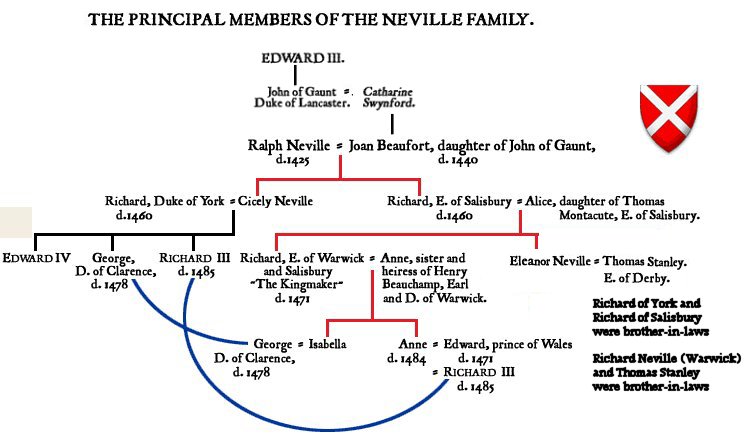 |
| |
|
15th
Century Medieval England was a period similar to
America's Wild West. Just as the Wild West
cattle barons squared off with complete disregard
for the law, wealthy landowners in England also
squared off with little regard for the law.
Richard Neville, the Earl of Salisbury, was a very
powerful man who had a long-standing grudge with the
neighboring Percy family. 1453 was the year
Henry VI descended into madness.
Simultaneously Henry Percy tried to ambush the
Salisbury family on their way to a wedding.
Although Salisbury's group emerged intact, the
rivalry was reignited.
At this
same time, Richard of York was having his issues
with Edmund Beaufort, the dandy of Margaret of Anjou
and the father of two illegitimate sons related to
our story.
Two
years passed and suddenly the King woke up from
catatonia. Now all hell broke loose.
Richard of Salisbury and Richard of York decided to
team up and confront the Beaufort-Percy combination
at the 1455 Battle of St. Albans, the English
version of OK Corral. The York-Neville team
won handily and killed Edmund Beaufort in the
process, thereby guaranteeing a Round II... and
III... and IV... and....
The Cold
War of the Roses had just gone Hot.
Thomas
Stanley had grown up in a family loyal to Henry VI
and the house of Lancaster. However, in 1457
Thomas formed an alliance with the powerful Neville
family by marrying Eleanor Neville, daughter of
Richard Neville, Earl of Salisbury.
This marriage marked the start of Stanley's long
acquaintance with Salisbury's son Richard Neville,
better known as Warwick, the man who would come to
be known as the Kingmaker. As we remember,
Warwick was not only the man who put Edward IV on
the throne, he was also the man who took Edward off
the throne. Hence the nickname.
So here
we have Lord Stanley, a Lancaster, developing a
potential alliance with the leading members of the
House of York. This 1457 marriage to Lady
Eleanor meant Thomas had one foot in the door of the
York-Neville alliance and one foot in service to the
crown. Interesting, yes?? What makes it
even more interesting is that marrying Eleanor put
Stanley in the thick of things, something he had to
know.
Lord
Stanley minded his own business as long as could,
but two years later the War of the Roses paid a
visit to Stanley's back yard. In 1459 Stanley
got news that Queen Margaret of Anjou was recruiting
heavily in Cheshire, his home base. Stanley
knew he could not ignore the civil war much longer.
Making
matters worse, Stanley's father had just died,
making Stanley the new head of the family. As
far as Margaret of Anjou was concerned, the Stanleys
had always been loyal to the crown. So
naturally the Queen came calling to ask for
Stanley's pledge of men. Stanley said he would
send men.
Meanwhile, the Yorkists under Salisbury, father to
Warwick, were mobilizing to neutralize the threat.
Entering Cheshire, naturally they sought assistance
from Stanley, Salisbury's son-in-law, Warwick's
brother-in-law. Stanley said he would send
men.
What a
way to begin one's new role as head of the family!
Caught between a rock and a hard spot, Stanley was
faced with quite a dilemma. Shortly Stanley
got news of a major fight.
Salisbury was commanding the Yorks. He had
just managed to elude the warrior Queen when he was
intercepted by Lord Audley's army at Blore
Heath, a location about 30 miles down the
country road from Lord Stanley's estate in Cheshire.
The battle started as a trap to catch York forces on
the move. Sure enough, the Yorks walked right
into it and suddenly found themselves outnumbered
10,000 to 5,000 (the Yorks were seemingly
outnumbered by the Lancasters in practically every
battle).
Although
Salisbury was outnumbered, through a series of
feints using a small stream that divided the armies,
he provoked the Lancasters into attacking him.
Salisbury's counter-attack proved deadly.
And what
about Lord Stanley? The Royal army under
Margaret of Anjou expected support from Stanley, but
didn’t get it. Although Lord Stanley claimed
to be a loyal royal, he never actually joined Queen
Margaret's army. Furthermore Warwick and
Salisbury expected Stanley would come to their
rescue. Indeed, Stanley showed up, but then he
failed to participate. Warwick was
flabbergasted.
Through
audacious brinkmanship, the young lord faked the
entry of his army into the battle, then suddenly
stopped just a mile away. Lord Stanley sat on
the sideline with 2,000 men and watched.
Meanwhile Sir William Stanley, his younger brother,
did actually fight for the Yorkists at Blore Heath.
William Stanley paid a stiff price as he would later
be attainted for his participation by the Queen.
In the
immediate aftermath of the battle, Lord Stanley had
the nerve to ride up and congratulate Salisbury on
his splendid escape from the trap. However,
just when Stanley came close to committing himself
further, he decided to withdraw his forces back into
Cheshire. Salisbury stood there perplexed.
This was
the start of the Stanley legend. No one could
figure Lord Stanley out. Why did he sit out
that battle? After all, at the time, his
brother-in-law was Warwick the Kingmaker, leader of
the Yorks.
After
the battle Lord Stanley wrote to the Queen to offer
his apologies and offer excuses for why he had not
seen fit to commit his men to battle. Margaret
of Anjou could not have been too convinced by his
explanations. Nevertheless when Parliament
petitioned for his attainder later that year they
were not successful because Margaret intervened.
During the fluctuations of the Wars of the Roses she
needed all the friends she could get, including
unreliable, slippery Lord Stanley.
This was
a close call. The wrong move here could have
meant disaster for the House of Stanley. Lord
Stanley's sympathies were 'York', but Stanley
did not wish to show his true colors till he was
more certain. This set the pattern for Lord
Stanley's career, a man always reticent to commit.
One year
later, the Yorkists had possession of the King and
ruled in his name. Now Lord Stanley decided it was
safe to begin cooperating with the Yorkist lords,
but only when it suited him. Stanley made sure
to stay away from the particularly bloody battles of
Wakefield (where both Salisbury and
the Duke of York, father and son, were killed) and
Towton (where York's eldest son Edward
defeated the Lancastrians and had himself crowned as
Edward IV).
Although
Stanley got no credit for his lack of participation,
he proved valuable to new king Edward by aiding his
brother-in-law, the Earl of Warwick, in mopping up
the remaining Lancastrians. Stanley played a
major part in the capture of Henry VI (1465) in the
Stanley stronghold of Lancashire. For his
service, Stanley acquired several new estates in the
process. For the time being, Stanley was a
York.
In 1469,
a crisis emerged. Warwick changed
sides!! Dramatic shifts between
1469 and 1471 made the political landscape
treacherous. Warwick's decision to switch to
the Lancasters affected Lord Stanley more than
anyone. In 1469, Warwick did his best to
secure Stanley's support against Edward, but Stanley
was non-committal. Consequently Warwick's
first try to eliminate Edward failed. Although
Edward was captured, it didn't do any good.
Then Edward kicked Warwick over to France. Now
Warwick made his alliance with Margaret of Anjou.
Upon Warwick's return to England, Stanley still
refused to fight, but nevertheless lent him armed
support in the restoration of Lancaster King Henry
VI. Edward was unseated and made a fugitive.
Edward ran to Burgundy for safety.
Stanley
was firmly on the Lancaster side now. Or was
he? When Edward began his amazing 1471
comeback, Lord Stanley disappointed Warwick by
refusing to help stop the returning Edward.
Nevertheless, Stanley promised not to help Edward
either. To all outward appearances it seemed
as though Lord Stanley had thrown his lot in with
the Lancastrian cause, but as usual looks were
deceiving. Thomas secretly sent his brother
William to Edward IV’s side when he landed at
Ravenspur to reclaim his throne. As for
himself, Thomas refused to fight.
|
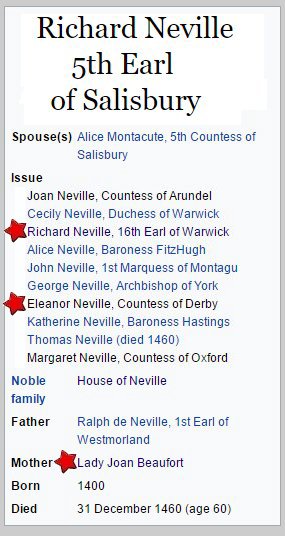
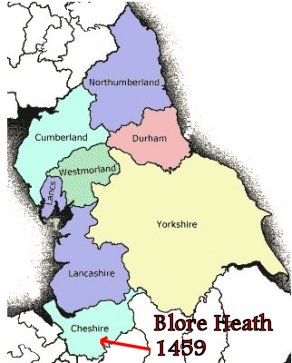
 |
| |
Think
about it. If Warwick won at Barnet, Stanley
could point to the men he had given Warwick in 1470
to unseat Edward. If Edward won, Stanley could
point to his 'regret' and 'change of heart'
by deciding to sit out the Battle of Barnet and then
Tewkesbury. Very clever.
Stanley's strategy worked like a charm.
Following Edward's comeback victory at Barnet
and the rout at Tewkesbury, Edward
forgave Lord Stanley for his earlier disloyalty on
the grounds that Stanley had stayed neutral the
second time around.
Lady
Eleanor's death in 1471 was a sad event which
nonetheless led to Margaret Beaufort's invitation to
marry. Stanley recalled how his marriage to
Eleanor had opened the door to his relationship with
the Yorks. Perhaps a similar marriage could
open other doors back to the Lancasters. Lord
Stanley, the undisputed master of moving forward by
sitting still, could not resist. His marriage
to Margaret would allow him to stay firmly in the
middle of any ensuing problems. Lord Stanley
was fairly brilliant in this way.
And what
about William Stanley? Stanley's younger
brother William had not only fought during the
Battle of Blore Heath, he would do so again in
several other 1460-1461 encounters. William
repeated this role during the 1469-1471 flare-up.
Seemingly by design, it fell to William to take the
heat off his older brother, the family leader.
William accepted it was his job to fly the family
colors, losing some, winning some, always staying
alive to fight another battle. William might
get attainted, but since Thomas held most of the
family's estates in his name, William's losses
ensured that his big brother never lost anything.
There
was amazing teamwork between the two brothers.
William was willing to take risks knowing in the end
that the House of Stanley always came out ahead.
This sublimation stood in stark contrast to the
destructive squabbling between the three York
brothers. George and Richard constantly argued
over who got which Neville girl and each attainted
estate by playing Edward against the other.
Edward, always the appeaser, did himself no favors
by indulging these two brats. Meanwhile,
William willingly accepted his role as the 'Designated
Loser' for the good of the family. Thomas
always made sure his younger brother was 'compensated'
in one way or another. As much as any family
in England, the Stanleys benefitted during these
turbulent times by playing both sides of the fence.
|
| |
|
Lord Hastings
Revisited
|
 |
|
| |
|
Thomas
Stanley had dodged a bullet in 1483. His close
call took place shortly after Richard had imprisoned
the Princes in the Tower. Their mother
Elizabeth Woodville had fled into sanctuary at
Westminster. Now there were repeated rumors of
plots and conspiracies being orchestrated by
Edward's widow.
Richard
was extremely paranoid that someone would take a
stand against his strong-arm tactics with the two
boys. His fears caused him to erupt on Friday,
June 13, 1483. William Hastings walked into
what he thought was a routine council meeting called
by Richard, Duke of Gloucester.
Hastings
was suddenly seized by armed men. Richard
began screaming at him, accusing the older man of
plotting with the Woodvilles behind Richard's back.
No trial by peers was offered. No proof was
offered. No witnesses were called. The
existence of the plot was upon Richard's say-so
alone.
Richard
condemned Hastings to death. When Hastings
left the chamber a few hours later, it was as a
prisoner being hustled out to execution. His
death on Tower Green was such a hasty affair that no
scaffold had been erected.
Lost in
the drama was a curious fact. Lord Hastings
was not the only council member arrested. In
fact, several of the noblemen in attendance were
arrested. One of them was Lord Stanley who was
roughed up pretty badly in the ensuing scuffle.
Stanley was briefly imprisoned, but later released.
Based on
what we know, who was more likely to be
treacherous... Hastings or Stanley? Lord
Hastings was the man who warned Richard to seize the
boys and take action against Elizabeth Woodville in
the first place. Lord Stanley was a known
snake in the grass. And yet Lord Hastings was
beheaded on the spot while Stanley was set free.
So why did Hastings die and Stanley live?
The
answer is very simple. Lord Stanley made it a
point to use his vast fortune to keep a large,
well-armed army at his disposal back in Cheshire.
Call it an 'insurance policy'. Richard
knew Stanley's son George, Lord Strange, could
quickly mobilize this army in northwest England.
In addition, brother William had his own army as
well. Supreme in the Midlands countryside
around Shrewsbury south of Lancaster, the Stanleys
had become the most powerful family in England.
And Richard knew it.
|
 |
There is
little doubt Richard III feared Lord Stanley more
than anyone. Sensing Richard's fear, in the
days to follow, Stanley played Richard like a
fiddle. Keeping his cards close to his vest,
Stanley kept Richard guessing.
On the
one hand, Lord Stanley's weird move to marry
Margaret Beaufort, the Lancaster matron, just added
to the confusion. On the other hand, despite
his odd choice of marital
partner, Stanley had never done a single thing to make
King Edward IV suspect Stanley's loyalty to the Yorks in any way
during the twelve years of peace.
After Edward's
death in 1483, Lord Stanley had been the first man
to congratulate Richard. Then came the master
stroke... after Richard had threatened Stanley's
life with false (??) accusations, Stanley forgave
Richard. "No harm done, lad."
Two
weeks later, guess who carried the great mace at
Richard's coronation?
Then,
just to further prove his loyalty to Richard,
Stanley actually fought at the side of
King Richard during Buckingham's ill-fated
Rebellion. Joining
Lord Stanley in the battle was his younger brother
William Stanley.
"See,
Richard, you have nothing to worry about. The
House of Stanley is firmly in your corner!"
Richard's fears were allayed, at least somewhat.
Now Richard tried to buy the Stanleys off. After the
rebellion was over,
Thomas and William Stanley were richly rewarded from
the forfeited estates of the dead rebels. Thomas
Stanley had performed so well he was appointed to
Buckingham’s position as Lord High Constable of
England. Sir William was made Chief Justice of
North Wales and was given land as well.
|
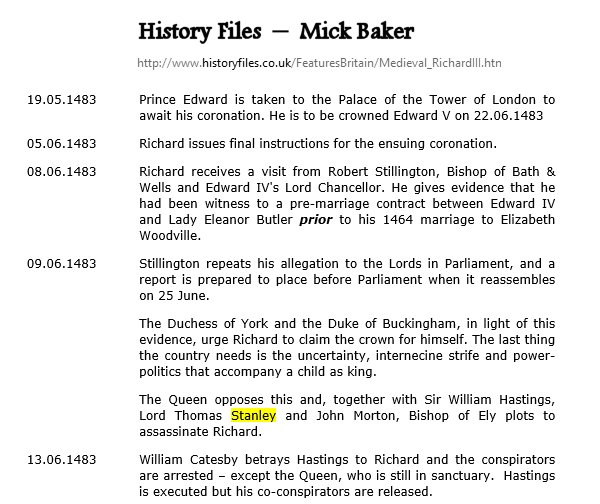 |
| |
|
As
always, Lord Stanley had made the right move.
He had converted Richard's paranoia into vast new
estates and position.
There
has long been speculation why Stanley sided with
Richard in the Rebellion and not his own wife.
Here is one possible reason:
"Richard was with the Earl of Northumberland and
Thomas, Lord Stanley, when he got word of the
rebellion. Richard did not really trust
either man as in the past they seemed to support
Lancastrian causes in the past.
Northumberland (Henry Percy) had proved to be
difficult during the years when Richard was Lord
of the North. The Late King Edward had to send
Northumberland orders, as he would not obey
Richard.
The same could have been said about Stanley.
He spent most of the time in whichever camp
benefited him the most. Richard kept
him under close eye as trouble and Stanley was
always close at hand. Richard was
reminded of Stanley’s wife, as he had heard that
Henry Tudor was playing a major role in the
Buckingham rebellion. (Source)
In
the weeks to follow something deeply unsettling came
to light. After
the dust had cleared, Richard III made a remarkable
discovery... Thomas Stanley's wife Margaret Beaufort
had been largely responsible for organizing and
funding the operation. Now Richard was very
confused. Thomas Stanley had fought hard for
him and yet Stanley's wife Margaret Beaufort was a
key conspirator in the rebellion. Whose side
was Stanley on?
Lord
Stanley was asked to explain. Stanley replied
to Richard that his wife's affairs were unknown to
him. If Stanley had known, he would have told
her to knock it off. Besides, did Richard not
see how hard Stanley had worked to put down the
rebellion? What further proof of his
innocence... and ignorance of his wife's moves...
did Richard need?
Richard
was really confused. What should
he do about Margaret? Under
normal circumstances, Margaret would have been
executed or imprisoned. But Richard did
neither. With visions of that standing army in
Cheshire, Richard decided to take Stanley's word. Such was the strength of Thomas
Stanley that Richard let Margaret off with a wrist
slap rather than antagonize her powerful husband.
Lest we
forget, Richard did something unusual... Richard handed
all of Margaret's estate to Thomas. Lord
Stanley now owned his wife's entire estate.
However, there was a catch. Upon Stanley's
death, Margaret's estate would revert
to the crown.
| |
|
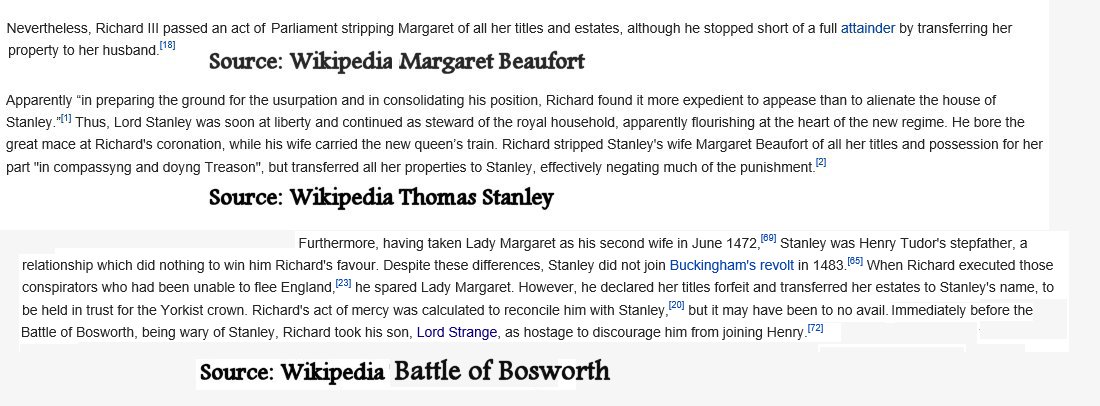
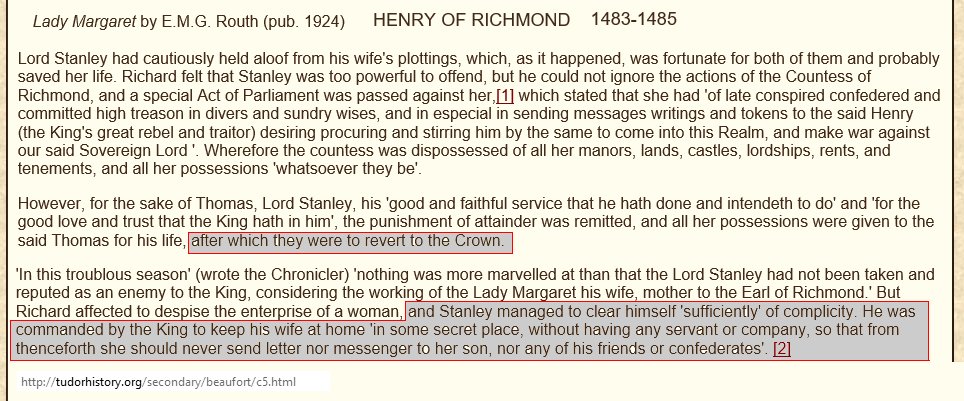
|
| |
|
Rick Archer's Note:
Doesn't this story strike the Reader as a bit
odd?
Here
is a woman, Margaret, who has just committed
treason and Richard has undeniable proof of her
complicity. Previously, Richard put Lord
Hastings to death for less evidence than he had
here. In addition, Richard has just
finished beheading Buckingham. But Richard
treats Margaret differently for the same crime.
Richard never even speaks to Margaret, the real
instigator. Instead he speaks to Thomas
Stanley and tells him all his wife has to do is
promise not to do it again, then go home and sit
in the corner. While she's at it, maybe
pray a little and repent.
The
thing to understand in my long saga is that I
originally set out to write a brief overview of
English history. Hence the title "Brevity
and Brexity". As it turned out, I
spent a month and a half researching and writing
this story. So much for Brevity.
I
invested my time because I began to see more
clearly how History is written. Things
happen, but since very few accounts exist,
everything becomes wide open to interpretation.
In particular, the 'Winner' gets their
version accepted as the undisputed 'Truth'
of what took place. The Winner picks
someone to write a favorable story or the Winner
makes sure that unfavorable documents
disappear... or both.
The
secret of interpreting History is to put oneself
in the place of the actor and imagine what must
have passed through their minds. On a
personal note, as one has surely guessed, Lord
Stanley definitely caught my eye.
The
story of 'Margaret's punishment'
seemed so absurd that I gave it a lot of
thought. My
problem is that write each story based on web sites
that usually just scratch the surface.
Based on what I read, I initially thought this estate-transfer/house
arrest solution was Richard's
idea. But then I began to wonder.
That is when it crossed my mind that maybe this
solution was Stanley's idea.
So here is my interpretation of how the scenario
might read if Stanley took control of the situation.
Richard:
"Lord Stanley, you were
invaluable to me in
putting down the rebellion. How do you suggest
I handle this matter of your treasonous wife??"
"Sire, I ask you to spare her. She is but
a silly woman who let her fever for her son
cloud her judgment. I suggest you place
her under my control. Strip Margaret of
her estate and give it to me. Without
money, she can do little damage.
I
will oversee the lands myself. And when I
die, let Margaret's estate revert to the crown.
I will order Margaret to stay close by, a form
of house arrest. She is not to leave my
home without supervision. You will have
nothing more to worry about, this I pledge."
In other
words, stripping Margaret of her estate may not have
been Richard's idea, but rather her husband's idea.
By betraying Margaret... for whatever reason...
during the Rebellion, suddenly Stanley had acquired
Margaret's vast estate for himself. And what
if something were to happen to Richard??
Gee, too bad, then after Richard was gone, Stanley
could petition the next king to either let him keep
it all or give it back to Margaret. Either
way, Stanley had made a shrewd bargain. Better
to keep the lands and titles in the family than give
it to Richard.
But how
would Margaret react? After all, Lord Stanley,
master manipulator, had gotten his wife declared a traitor and
placed in his care under house arrest, with all of
her lands and fortune forfeit unto him.
Margaret had to be incredulous.
Wouldn't
it be fascinating to be a fly on the wall when
Margaret learned the news? Let's fantasize how
the dialogue might go.
“On
the graves of my ancestors, I swear, Stanley,
you have robbed me! Did you betray me just to get my fortune?”
"Calm down, Margaret. I have not
betrayed you. I was stuck at the side
of the King when the fighting broke out.
He never let me out of his sight.
Thanks to all that flooding, I could already
see that Buckingham's uprising did not have
a ghost of a chance to succeed. There
were reports that his own men had deserted
him. I was not about to throw
everything we have worked for away on this
failed scheme. There's an old saying,
'Better to live and fight another day'.
So, yes, I fought for Richard and so did my
brother. What choice did I have?
Buckingham was a lost cause.
Now, as for the deal I struck, when the
discussion began, Richard was so angry he
was about to sever your head from your
shoulders. Then he discussed a certain
cold dungeon with unusually meager rations
and thin blankets. In addition, you
were about to be attainted. Richard
was completely within his right to remove
your entire estate. Who would you
rather have in control of your estate,
Richard or me?
But I talked him out of it. I not only
saved your life, I saved your estate.
Your holdings are quite safe with me.
All we have to do is remove Richard and your
son will be able to restore your lands to
you."
Please keep in mind that I have just made up
History. I have no idea whether this
conversation took place or what was said. But
if we look at history from Stanley's point of view,
my scenario makes sense.
If this
conversation did take place, was Stanley telling the
truth? Who can say with this guy? But
his argument was compelling enough for Margaret to
buy his story. Plus, what other choice did she
have? Stanley now owned all of Margaret's
lands.
If there
was to be a coming battle and Henry won, Margaret's
lands would be safe AND Stanley would be rewarded.
So Margaret's fears were allayed when she realized
it was completely in Stanley's interest to help
Henry win.
However,
if Richard won the coming battle, Stanley was in big
trouble... unless Stanley could find a way not
to oppose Richard. Stanley had to find
a way to help Henry and stay neutral at the same
time. Now how does someone do that? I
guess we will find out when the time comes.
It was
now 1485. Two
years had passed since Buckingham's Rebellion.
Henry Tudor was coming for Richard.
The support of Thomas and William Stanley were critical
to the king. Would Richard be able to count
on these men again like he had during the rebellion
of 1483? Richard was desperate to find out.
Richard was about to
discover exactly what he feared the most... Lord
Stanley was sitting on the fence.
|
Defections
|
| |
|
What a
shame Richard's immense talent had to go to waste.
If one can disregard Richard's ruthlessness, then he
should be admired for his courage and intelligence.
As a mere teenager, he helped his brother Edward
regain his crown. Richard's attack at the
Battle of Barnet won the day against far older and
more experienced opponents. Weeks later,
Richard's defense at Tewkesbury won the day by
thwarting the Duke of Somerset's surprise attack.
Ever
since Henry Tudor's escape during Buckingham's
Rebellion, Richard had known this showdown would come.
Well aware that Henry Tudor would be sailing soon,
Richard had been clever. Since Richard was
uncertain where Henry would land, he posted
his men in the epicenter of England. His men
were 100 miles from all the likely landing spots, a
three-day horse ride.
Richard's strategy was to let the local commander
keep Henry occupied long enough for Richard's
reinforcements to race to the spot. A landing
party would not have enough time to unload their
ships and gain a foothold on English soil.
Richard's counter-attack would destroy the
vulnerable invasion force.
|
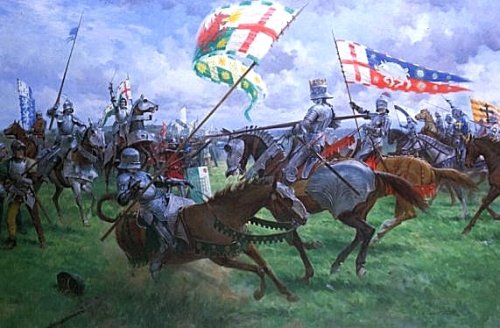 |
| |
|
Interestingly, German General Erwin Rommel expected
to use this same strategy when preparing his D-Day
defenses. Unsure where the Allies would land,
Rommel kept a crack Panzer tank unit on the
Belgium-French border so it could race to whatever
point the Allies landed and decimate the attack
while the men were still pinned down on the beach.
Rommel's
strategy may very well have worked except for one
thing.... Rommel needed Hitler's permission to
release the tanks. Unfortunately, Hitler had put a 'do not disturb' sign up for the night.
No one dared knock and the Panzer tanks never moved.
Let me
say this again... for all his faults, Richard was
not stupid. Richard knew full well that Jasper
would likely encourage Henry to land in Wales.
It made perfect sense. However Richard was not
going to bet the house and fully commit to one
landing spot. Jasper's spies would warn Henry
if something was amiss and Henry would land
elsewhere. So Richard did the next best
thing... he shored up his support by handing out
lands, titles, and offices to men who had shown
loyalty to him in the past. Finally Richard
felt secure because he had extensive control over
south Wales.
|
| |
|
Richard's strategy should have worked, but it didn't.
Early in August, Richard was alarmed to find that
Henry's forces were moving through Wales unopposed.
Richard turned white with fear and anger. Just
how exactly did this come to pass?
Mill Bay
had been chosen as a landing point because it was completely hidden from
view. No resistance was given by the cohort of
Richard's men stationed at Dale where Henry and his
men spent the first night. They completely
failed to keep the invader at bay by the bay.
In the
morning Henry marched to Haverfordwest, the county
town of Pembrokeshire. His men were received "with
the utmost goodwill of all". Welshman
Arnold Butler met Henry in Brittany and
announced that "the whole of Pembrokeshire is
prepared to serve him!"
Richard's lieutenant in South Wales, Sir Walter
Herbert, failed to move against Henry. Two of
Herbert's officers, Richard Griffith and Evan Morgan,
deserted to Henry with their men. The next man
to face Henry was Rhys ap Thomas, the leading figure
in West Wales.
Richard had appointed Rhys
Lieutenant in West Wales for his refusal to join
Buckingham's rebellion. Did Rhys ap Thomas
stop Henry? No, he defected to Henry's side
and brought with him many men.
So far,
Henry had been greeted warmly at every stop he made.
Henry was seen as the great Welsh champion.
The importance of Henry's Welsh blood and ancestry
should not be underestimated. Welsh support
would prove critical to Henry.
So far,
every single
man in Wales that Richard had rewarded for their loyalty
had welcomed the invasion force with hugs and kisses.
Richard
had just been given his first hint things weren't
exactly working out as planned.
|
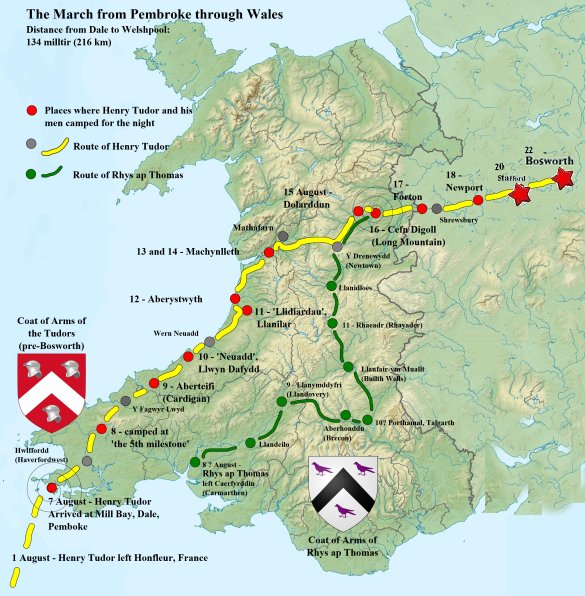 |
Geography
There is
a very cynical saying that War is God's way of
teaching people Geography. So let's use the
War of the Roses to learn a little bit about Great
Britain's geography.
Off the
top of your head, what do you suppose Wales and
Scotland have that England doesn't have?
C'mon, this shouldn't be too hard to guess.
(Hint: It's big.)
Next
question. What did the Romans leave behind
that the English found particularly useful?
Next
question. Here in America, what place is
called the Gateway to the West?
Next
question. What place in England is known as
the Gateway to the Midlands? (Hint: unless you
are from Great Britain, you are not expected to know
this answer.)
Next
question: Given what you know about the
Gateway to the West, what do you suppose the Gateway
to the West and the Gateway to the Midlands have in
common??
Last
question: What geographical feature doomed Margaret
of Anjou at the Battle of Tewkesbury? (Hint:
it's on this map.)
Quit
your bellyaching. Hey, I gave you a map!
Figure it out.
|
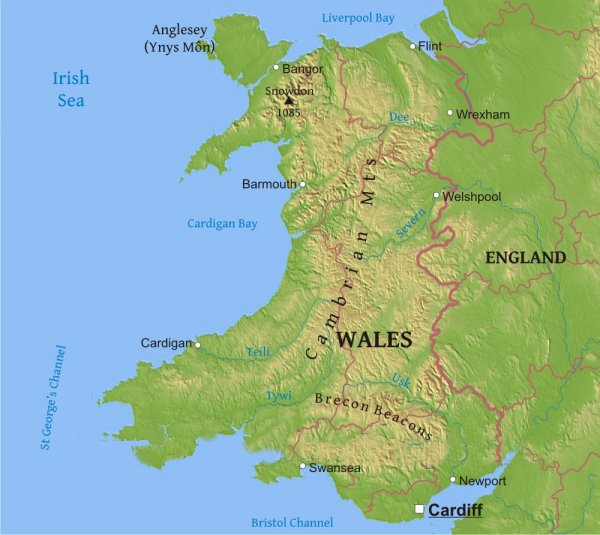 |
Over My Belly
So what
Big Thing do Wales
and Scotland have that England doesn't?
Both Wales and Scotland are extremely mountainous while England
is relatively flat. Over the centuries, the
Welsh and the Scots have used those mountains as
defensive barriers to keep the English out. As
we look at the map, we see the only routes into
Wales are valleys formed by the rivers... unless of course
someone cheats and attacks using the sea.
By now,
we also have a pretty good idea who won the looming battle.
This, of course, takes away
much of the suspense. But Henry and Richard
had no idea of the outcome. They were both on
pins and needles. Richard was upset that Wales
had welcomed Richard with open arms, but he was not
entirely surprised. After all, Wales was
Henry's turf.
Okay, so
Wales had not panned out, but Richard
had another ace up his sleeve. Pretty soon
Henry would be on Richard's turf. Let's see
what happens then.
Henry
had a lot on his mind. Richard's army was
bound to be much larger, better
equipped, and better prepared. Richard knew
the territory well and would surely stake out the
finest ground to mount his defense. As Henry's
army trudged north, they used an ancient Roman road
that cut through the mountains using a valley formed
by the Severn, England's longest river.
|
| |
|
Once
Henry's army left the mountains of Wales, they
continued along the Roman road until they came to Shrewsbury, the traditional gateway to the
English midlands. In a manner similar to
America's St. Louis, Shrewsbury was very important
because it had the only bridge across the mighty
Severn River for miles and miles. Henry was
about to learn the hard way that the English attitude
towards his invasion was much cooler than the rabid
Welsh.
Shrewsbury was Richard's ace in the
hole. It had two bailiffs, Roger
Knight and Thomas Mitton who had been in power for about
two decades. Both men had prospered under Richard
III, most notably from the failure of Buckingham’s
Rebellion. Mitton had not only received Buckingham’s castle, Shrewsbury’s tax bill was significantly reduced,
making Mitton very popular. Mitton fully expected to be rewarded for
standing up to Henry. Another castle perhaps??
Richard
had given Mitton the perfect excuse to deny entry. Richard
had scared the wits out of the countryside
people by warning that Henry's foreigners would rape
and pillage in revenge for what the Black Prince had
done to the French a hundred years earlier. The people of Shrewsbury had no desire
to see Henry's French mercenaries come in and
plunder their town. Therefore, when Henry
requested permission to march through the streets, Mitton made an odd reply – “over my belly!” – which
we can assume is another way of saying 'over my
dead body'.
|
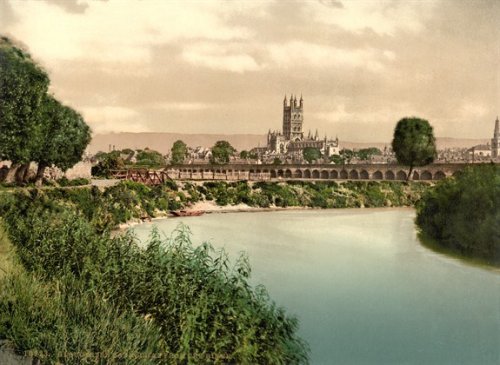 |
Henry
could not afford to go around the city thanks to the
ever-swollen Severn River. Nor
did he wish to engage in a fight. Henry was
engaged in a public relations battle almost as
fierce as the coming fight.
Richard
had painted a dark picture of Henry as a desperate
outlaw who had no money to pay his troops.
Richard said Henry had promised his men that they could murder
and take what they wanted in repayment. Henry could not afford to
attack these people of Shrewsbury lest rumors of his
aggressiveness spread.
So Henry
retreated. At a nearby village, he composed a
letter to the bailiffs, promising that his men would
simply march through Shrewsbury peacefully and cause
no damage or harm. He respected the oath of
loyalty to Richard III and did not expect any of the
townspeople to break it. The letter accomplished
little. Mitton still said no and repeated his
phrase 'over my belly!'
Henry was
in serious trouble. If he couldn't get past
Shrewsbury, his entire campaign would come to a
total stand-still. Then to his surprise, the gates came
open. Henry barely believed his eyes.
The
arrival of Rowland Warburton had made a
huge difference. Warburton persuaded the
bailiffs to let Henry pass. And who was
Rowland Warburton? He was a guy who lived at Blore Heath.
Blore
Heath... where have we heard that name before?
As it turned out, Shrewsbury was 20 miles south of Blore Heath, one of the famous battle sites during
the War of Roses.
|
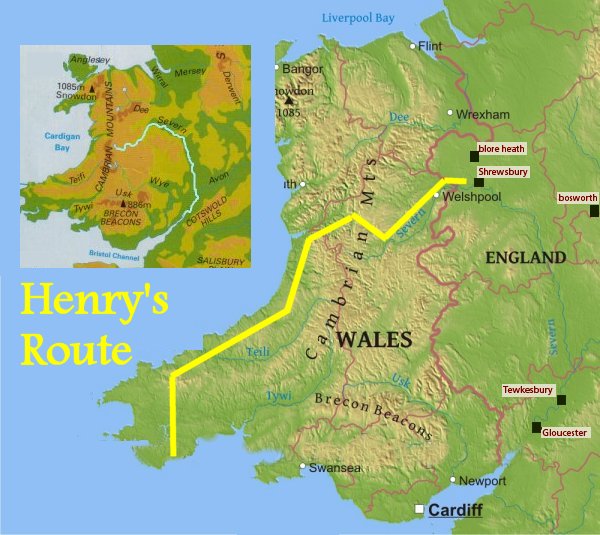 |
And who
exactly was Rowland Warburton? He worked for
Chief Justice of North Wales, a man who just
happened to live near Blore Heath. The Chief
Justice of North Wales had ordered the gates to the
town come open.
And who
exactly was the Chief Justice of North Wales?
None other than Sir William Stanley, Richard's
carefully-chosen appointee as Chief Justice of North Wales.
Yes, indeed, William Stanley was Richard III’s chief lieutenant
in this area.
Other than John Howard, the Duke of Norfolk, no
single man in the kingdom had received more land and
power than William Stanley. Richard was
counting on William Stanley to stop Henry at the
Severn and contain him so the king's army could come and finish the
invasion off. Surely Richard's
well-rewarded commander would hold the line.
Nope.
Henry received an invitation to visit William at his
manor. Henry was
served tea and crumpets with an offer of perhaps a friendly
cricket match out on the lawn. Rumors have it
that William and Henry had a pow-wow in the process.
Yes, the
English citizens were afraid of Henry and his
terrible reputation, but in this part of
the world, the Stanley name was all-powerful.
The Stanley name was impressive enough to sway
even John Mitton who no doubt saw his hopes for a
new castle go up in smoke.
Interestingly, John Mitton was a man who had a
well-known reputation for always keeping his
word, a very good thing to have in politics. As Henry crossed the bridge, John Mitton made a point to lay
down on the ground. To much fanfare and
hilarity, Henry politely stepped over the man's belly, thereby
allowing Mitton to
keep his oath. We now see why Mitton didn't
say 'over my dead body'. Smart man.
Henry was relieved to pass through, but shaken to
realize that his support among the non-Welsh
populace was not widespread. Indeed, the
lesson of Shrewsbury was repeated in next
town he marched through. Since the average
citizen did not recognize his claim to the throne,
Henry had little to celebrate. This campaign
was shaping up as another 'Buckingham Rebellion'...
a reckless, seat of the pants, make-it-up-as-you-go-along
operation observed by a lukewarm, apathetic
citizenry that preferred to sit this one out.
Henry
was very worried.
|
Loyalty and Betrayal
When the
news that Henry had crossed the Severn River reached
Richard, he knew that William Stanley had betrayed
him. Richard was consumed with bitterness at
trusting the man. Now Henry was only 50 miles
away. To hell with William Henry.
William Henry was a pipsqueak. It was his
brother Thomas Stanley that Richard was worried about.
Richard was surely doomed if Lord Stanley opposed
him. Lord Stanley had been invaluable in
putting down the Buckingham Rebellion. But
could Richard count on Stanley again??
One
month earlier, an unsettling event had taken place.
In July 1485, about three weeks before Henry Tudor
landed, Thomas Stanley had sought permission to
leave the court and return to his northern estate of
Lathom in Lancashire. Stanley said he was
going to visit
a relative. The
king was no fool; Richard
allowed Stanley to leave London but
asked that
George, Stanley's son and
heir, remain behind.
Richard
made his request very politely... 'Lord Stanley,
we need your son to stay behind to fill your place
on the Council'.
But
everyone understood that George Stanley, 25, was
being kept as a hostage to ensure Thomas Stanley's
continued loyalty.
Now as
Henry moved through the English countryside, Richard
had not seen Thomas Stanley in over a month.
Considering William Stanley had just betrayed him,
Richard must not have been feeling too sure about
Thomas Stanley either. Nevertheless, Richard reassured
himself that George, also known as Lord Strange (no,
I am not making this up),
remained in
his household to assure his father’s
good behavior.
Surely no father on earth would risk his son's life
to betray his king.
Let
us ask what might be going through Lord Stanley's
mind as the two armies grew closer. Thomas Stanley had a decision to make.
Lord
Stanley had gained a reputation of remaining neutral
and not supporting any particular side in a battle
until he was absolutely positive which side would
win. Even then, the chances of him involving his
army were, to an extent, unlikely. Though this
strategy does not seem to an honorable
one, it gained the Stanley family more friends than
enemies. Lord Stanley had shown he was
master of taking advantage of any sort of
situation.
Is it
possible to grow stronger by sitting idle??
Thanks in large part to Stanley's odd fence-straddle
strategy, Stanley had the largest private army in
England after the King himself. And why was
that? There had been 30 years of fighting.
All the great Houses of the land had been decimated
by the civil war... House of Neville, House of Beaufort,
House of Percy, House of Stafford, House of Howard,
and House of York.
Did you
notice the similarity to the Game of Thrones?
House Stark, House Arryn, House Harrenhal, House
Lannister, House Durrandon, House Gardener, House
Martell. But Game of Thrones had seven houses
and the War of the Roses only had six. Or did
I miss someone? Hmm. Maybe the Reader
can help me. Can you think of a Seventh House?
As it
turns out, yes, there were Seven Houses in the War
of the Roses, but one of the Houses had never known
serious losses... because it never fought.
The
House of Stanley was virtually intact since the
start of the Wars. Lord Stanley enjoyed huge popularity
at home because he never risked his men's lives
unnecessarily and he kept his homeland out of the
fighting unless it was obvious he could win with
little risk.
When it came to 'Loyalty', as leaders go, one
could imagine Lord Stanley enjoyed the most
popularity of any leader in the country.
Unlike Richard, Stanley's men stood firmly behind him
because they knew he was the smartest Lord of all.
With
leadership comes responsibility. Lord Stanley
had a choice between King Richard and a young man
who just happened to be the son of his wife.
One would imagine the temptation to support his wife
and his stepson would be strong. But Stanley
had other factors to consider. For example,
which of the two men, Richard or Henry, would be the
best leader for the country?
What is
interesting about Stanley is he might actually think
in terms larger than simply his own personal gain.
If it came down to what would benefit him
personally, no doubt the greatest gain would be to
have a stepson as king. On the other hand,
Stanley had never met Henry. His only
knowledge of the boy had come from his association
with the lad's mother. In this case, one has
to recall Stanley's curious decision to back Richard
over his wife during Buckingham's Rebellion, a
decision which baffled many.
Right
now the life of Stanley's son George was at stake.
Stanley was forced to deal with this implicit threat
to his son's life. There is a difference
between serving a man out of loyalty and serving a
man out of threat. Loyalty is difficult to give
when there is a sword pointed at one's child.
Compliance, perhaps, but not loyalty. This was not the first time
Richard had threatened Stanley. No doubt
Stanley still remembered the day two years
earlier when Richard had his men seize Stanley and accuse him of plotting against him
(the Hastings situation).
That was the kind of memory that does not tend to fade away.
So, yes,
Stanley obeyed Richard out of necessity, but it
would be difficult to imagine Stanley felt any
loyalty to Richard, especially not after seeing the
head of his colleague Lord Hastings roll without
need. As much as anyone in the kingdom,
Stanley had witnessed first-hand how Richard had
usurped the crown with cold-blooded assassinations
and lies about the legitimacy of Edward's children.
One can imagine Lord Stanley felt little respect for
King Richard.
If I may
offer my own observation, I doubt seriously Lord
Stanley was on the fence as the battle brewed.
I base my decision on several factors. The
main fact is that if Richard won, all of Margaret's
lands would stay with Richard upon Lord Stanley's
death. Stanley would rather keep those lands
in the family. Therefore it was very much to
Stanley's advantage to back Henry... but not show
his hand in the process.
•
There was a report that
suggested Lord Stanley was the man who
tipped off Henry there was a plot against him in
Brittany.
•
There was a report that
hinted Lord Stanley had helped convince Sir
James Blount, captain of the Hammes prison in
Calais, to
oppose Richard and set Lord Oxford free at Hammes prison. After
Blount changed sides, Lord Oxford escaped to join Henry Tudor in Paris.
Understandably, this upset
Richard no end. To begin with, the
Oxford incident was indicative of the growing lack of loyalty to
his
regime. But even more important was that Henry finally had
an experienced general to lead his army.
•
When Richard received reports early in August that
Henry Tudor had crossed the corner of North Wales
unmolested, he knew for a fact that William Stanley
had betrayed him. Indeed, by opening the door
at Shrewsbury, Sir William had effectively
cleared the path for Henry Tudor to continue his
invasion. Knowing the Stanley brothers' penchant
for teamwork, it is unlikely William would have
done so without his older brother's approval.
•
In the week prior, Lord Stanley
disobeyed a direct order from Richard to bring
men to join him on the battlefield. Instead Stanley
claimed 'illness'. Poor Stanley, he
was too unwell to answer his King’s summons.
This meant Stanley would not bivouac with
Richard's army. However, Stanley did
promise to meet Richard on the battlefield.
•
One week prior to
the battle, Lord Strange tried to escape from
Richard, but was caught. No doubt Lord
Strange knew his father’s intentions were to
back Henry. If that was the case, then
Strange must have known his own life was likely
forfeit. His actions suggest Strange was
scared for his life and wanted to save his own
neck.
Under pressure, Lord Strange admitted that both
he and Sir William had been plotting with Henry
Tudor. However, Lord Strange swore he
had no idea what his father intended to do.
Lord
Strange was probably telling the truth. No one
ever knew for sure what Lord Stanley was thinking.
My guess is that Lord Stanley had one more question
to ask before he made up his mind... what kind of king would Henry Tudor make?
Lord
Stanley had asked his brother William to conduct an
initial interview at Stafford. Apparently Henry
passed his first audition since he was granted a
follow-up interview with both William and his brother, Lord
Thomas Stanley. This took place at Thomas
Stanley's camp in Atherstone two days before the
big battle. Richard's army camped atop a large
hill near the town of Bosworth. Atherstone lay six miles
to the
southwest.
Oddly
enough, after the interview Henry still wasn't sure where he
stood. Legend has it that Lord Stanley
assured his stepson of eventual support. Of course,
we all know promises can be easily broken,
especially promises made by Lord Stanley. All
Henry knew was that neither man had committed to fight with
him. Henry's mother had warned him the Stanley brothers were rumored to
deliberately take opposite sides during a conflict.
That way one Stanley would always win no matter what
the outcome while the loser would immediately pledge
undying allegiance to the winner... until the next
battle of course. People
were still trying to figure out how it was possible
that the Stanleys had backed Richard during the
Buckingham Rebellion. Thomas Stanley had to
know his wife Margaret was involved with the rebels,
so whose side was Lord Stanley really on?
Buckingham's Rebellion had been
a perfect example of a situation where either way
the Stanleys would win. If the Rebellion
failed, the Stanleys had backed King Richard.
If the Rebellion succeeded, Lord Stanley would tell
Margaret Richard had been at his side and it was too
risky to show his hand. No doubt Margaret would
then put in a kind word with her nephew Buckingham
or her son Henry.
The
English had seen this before. They
called Lord Stanley a 'trimmer', someone who
adapts his positions to match prevailing
political trends for personal advancement. In
other words, a trimmer 'trims' his sails to take
advantage of both the wind and the 'win'.
A clever phrase indeed and quite apt in this case.
Henry
may have been kept in the dark, but Richard was
pretty sure that Lord Stanley's heart was with
Henry.
| |
|

|
| |
|
Rick Archer's Note: Here
again we have an odd situation being
reported from Richard's point of view.
All the websites said pretty much the
same thing, 'Richard kept George as
hostage.'
However, I felt
suspicious.
I began to wonder if
this was Stanley's idea,
not Richard's. If one looks at
this from Stanley's point of view, this
hostage situation gave Stanley a
face-saving reason to stay neutral.
Curious, I nosed
around to see if anyone else was
suspicious about Stanley's
detached attitude towards his hostage son George.
A man named Richard P. McArthur writing for the
Richard III Foundation
appeared to agree with me:
"Could the idea of using Lord Strange as hostage
been Stanley’s? Richard III seems to have
asked no one else for hostages. The gambit would
be excellent for inducing Richard to allow
Stanley to be out of range of Richard’s
immediate power. Richard could probably be
counted on to be very hesitant in punishing
Strange. The fact that his son was in
Richard’s hands would also serve Thomas Stanley
as an excuse to Tudor for a lot of
procrastination."
Mr. McArthur
suggested that Lord Stanley was
secretly pleased by the hostage situation.
After all, it gave him the perfect excuse to tell
Henry, Margaret, and Richard 'why' he would sit the
battle out... which is probably what Stanley
wanted to do all along. Why risk
making real enemies when one can merely
irritate them instead?
Was Stanley really willing to deliberately risk his
son's own life? It is chilling to believe he thought
up the hostage situation on his own as a clever excuse,
but I would not put it past him.
"Gee,
Henry, I want so badly to send my men out on the
field to face that monster Richard, but he
has my son!"
"Richard,
you can count on me. After all, I knelt
before you and pledged my oath. In
addition, of my own choosing, I offered
you my son as a firm sign of my good will!
You will see me bring my army to the field, I
promise."
Earlier I made this
point:
However, if
Richard won the coming battle,
Stanley was in big trouble...
unless Stanley could find a way not
to oppose Richard. Stanley
had to find a way to help Henry and
stay neutral at the same time.
Now how does someone do that? I
guess we will find out when the time
comes.
We just got our
answer... Stanley had used his own son
as collateral.
|
| |
|
Countdown to Battle
Like his brother, William Stanley also stayed
non-committal. Although his actions in Wales
and Shrewsbury had already labeled him a traitor,
William Stanley would not obligate himself to unite
his force with Henry's. On 22 August
William pitched his camp near Atherstone next to his
brother. This spot was some distance from both the main
bodies. Their post at Atherstone formed a
triangle of sorts with Richard's camp to their right
on the other side of a marsh and Henry's camp to
their left. Henry and Richard knew this
meant the Stanley brothers would not
publicly declare their support for either man.
On the
eve of the battle, Richard was angry. Lord
Stanley had 3,000 followers and his brother William
had another 2,000. Lord Stanley had promised
to fight with him. Well, this was put up or
shut up time. King Richard sent Stanley a
message that unless he moved his forces to align
with his, he would put Lord Strange, the hostage, to
death.
Lord Stanley sent a terse reply "that he might do
so at his pleasure."
Stanley had defied his order. Richard
immediately lost his temper and ordered Lord Strange
to be executed at the start of the battle tomorrow.
Then he calmed down and decided it would be wiser to
wait to see what Stanley did in the morning.
Richard sent Strange to a tent under heavy guard.
(Rick
Archer's Note: Stanley appeared to
be betting that Richard was a rational man.
He expected Richard would realize that to kill
the hostage too early would cost him his
leverage. But what kind of man has the
guts to make that kind of bet?)
Truth be
told, Richard was less troubled by Stanley's
waffling than Henry. After all, Richard would
have been content if the two Stanleys simply stayed
out of the battle whereas Henry was desperate for
their support. Richard’s army had larger
numbers and far more confidence.
Furthermore, Richard
did not even have to win. All Richard had to
do was avoid being killed. In addition to his
12,000 men, Richard had reinforcements waiting for
him in Nottingham
and Leicester. Richard could lose today and
fight another battle tomorrow. Not Henry.
This coming battle was his only shot. With
Richard sitting pretty up atop his hill, he smiled
in the knowledge that Henry must be terrified.
Richard
was correct.
Henry was indeed panic-stricken on the eve of the
battle.
If either
Lord Stanley or William Stanley backed Richard, it was
all over.
If Lord Stanley and William Stanley
decided to sit it out, then Richard still had the superior
forces and the experience.
Henry
believed his only chance of victory would come if
the Stanleys would fight on his side. But that
seemed unlikely. In his private interview
shortly before the battle, Henry attempted to win
them over, but he was apparently unsuccessful.
Meanwhile, he knew that Richard held Stanley's heir
hostage. How could Henry hope that Lord
Stanley would defy Richard in this circumstance?
Henry was in a near-hopeless position. Without
Stanley, his badly-outnumbered, ragtag army stood
little chance of victory. His men seemed just
as nervous as he was. Their loyalty to him was
tenuous at best. If the battle started poorly,
no doubt the weak of heart would flee on the spot
and save their own skins. The battle could be
over the moment it started.
At this
point, Henry despaired that it was hopeless.
Even Margaret is suddenly struck by just how long
the odds were. No doubt she was terrified of
losing her son on the battlefield.
Seeing her son so despondent, Margaret Beaufort
decided to intercede. Riding over to Lord
Stanley's camp, she confronted her husband and
begged him to fight.
"Husband, I implore you to fight at my son's side
tomorrow."
"You
overlook that this action will cost me the life
of my son and heir. I will not abandon my
son for yours."
"“Your
son will be honored as a man of courage, the first
to fall in Henry’s service,”
Stanley's reply was quite fascinating.
"Margaret, I do not find this comforting.
Think about what you have asked.
You have asked me to sacrifice my son so that your
son will live."
"But Henry has a divine right to rule!"
Stanley:
"If that is truly the case, then you should have
nothing to worry about."
|
|
The Ghosts of Richard Pay Him a Visit |
| |
|
|
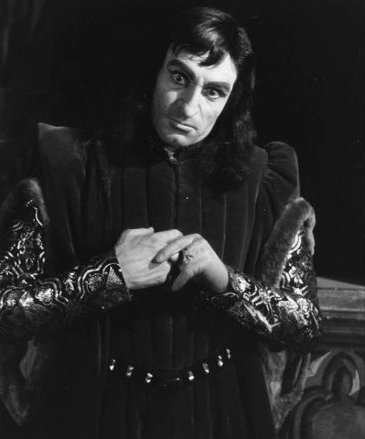 |
Richard
was feeling good about his chances when he went to
bed. However, William Shakespeare suggested
Richard was having nightmares.
If one
believes Shakespeare, Richard had murdered
enough victims to fill a cemetery.
Through
the centuries, Shakespeare’s
dark depiction of Richard has
remained unshaken.
No one who has seen Richard III has
any trouble visualizing Richard as a
deformed Machiavellian
who betrays his dead brother,
murders his nephews to gain his crown and poisons
his wife to pursue his voluptuous niece.
As a malicious, deceptive and bitter usurper who seizes
England’s throne by nefarious means,
Shakespeare’s
Richard revels in his own villainy.
In his famous “Now is the winter of our discontent”
speech, Richard
shamelessly proclaimed:
“I am determined to prove
myself a villain.”
|
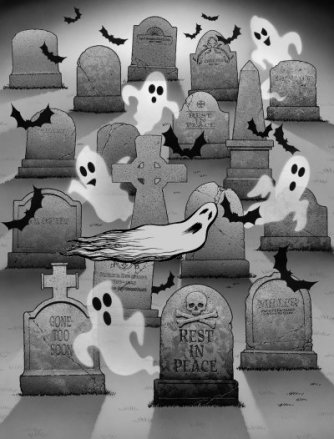 |
| |
|
The
problem for the audience is that Richard is so damn
interesting. Richard is an undeniably charming and complex
figure who sucks in the audience with his immoral logic
and dazzling wordplay. The audience
shakes its collective head in astonishment that
someone this shrewd had to resort to such foul means
to get what he wanted.
But then we stop liking
Richard thanks to a brilliant Shakespeare scene...
Richard's nightmare. In this nightmare,
Richard’s sins come back to haunt him – quite
literally!!
According to William
Shakespeare, on the eve of
battle, Richard was haunted by the memory of his
crimes. Shakespeare
has found a clever way to help us recall each of
Richard’s murder victims. The
specters of these victims appear one by one in a roll call of ghosts
who
visit Richard in his sleep.
They each point to Richard
and claim to have been murdered by
the king.
| |
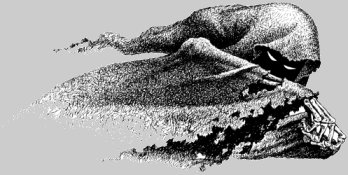 |
•
Prince Edward of
Westminster
•
King Henry VI
•
George, Duke of Clarence
•
Earl
Rivers (Anthony Woodville)
•
Richard Grey
•
Thomas Vaughan
•
Lord Hastings
•
The Princes in the Tower
•
Duke of Buckingham
•
Queen
Anne Neville
|
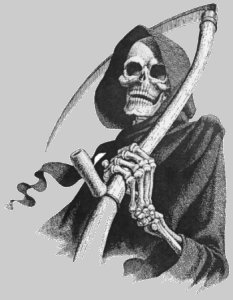 |
|
| |
The
king is visibly shaken
by the ghosts of his murder victims. One by one, each ghost
recalls what Richard has done to them and condemns
him to death on the battlefield. The
ghosts parade
past Richard and chant "Despair and die!"
Smug and
confident earlier in the night,
Richard is now struck by doubt.
Forgetting the glee he
formerly took in his wrongdoing, he suddenly lacks
conviction about the wisdom of his actions.
“O no, alas, I rather hate
myself for hateful deeds committed by myself.... I am a
villain.”
At one point, there were so many ghosts, the stage
barely has room to accommodate them all. There
was also a strange twist in the dream scene.
Shakespeare forced Richard to stand by and watch as
the ghosts leave to pay Henry Tudor a visit.
The ghosts offer
encouragement in the upcoming battle. Richard was
understandably quite shaken
when he awoke.
Shakespeare
believed what goes around comes around.
Shakespeare knew the audience would take
satisfaction in the thought that Richard's
evildoings would come back
to haunt him, first in his
dreams, then on the battlefield. At
heart, most people in Medieval England yearned for
justice and fair play. The rest took part in
the War of the Roses.
|

|
The Battle of Bosworth |
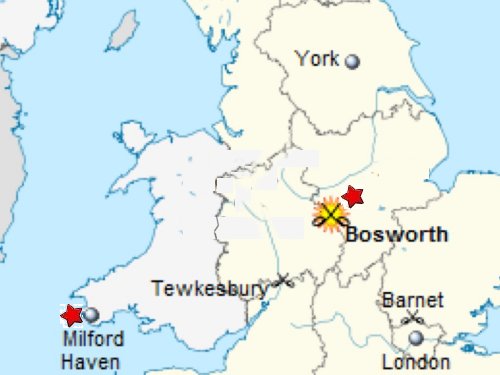 |

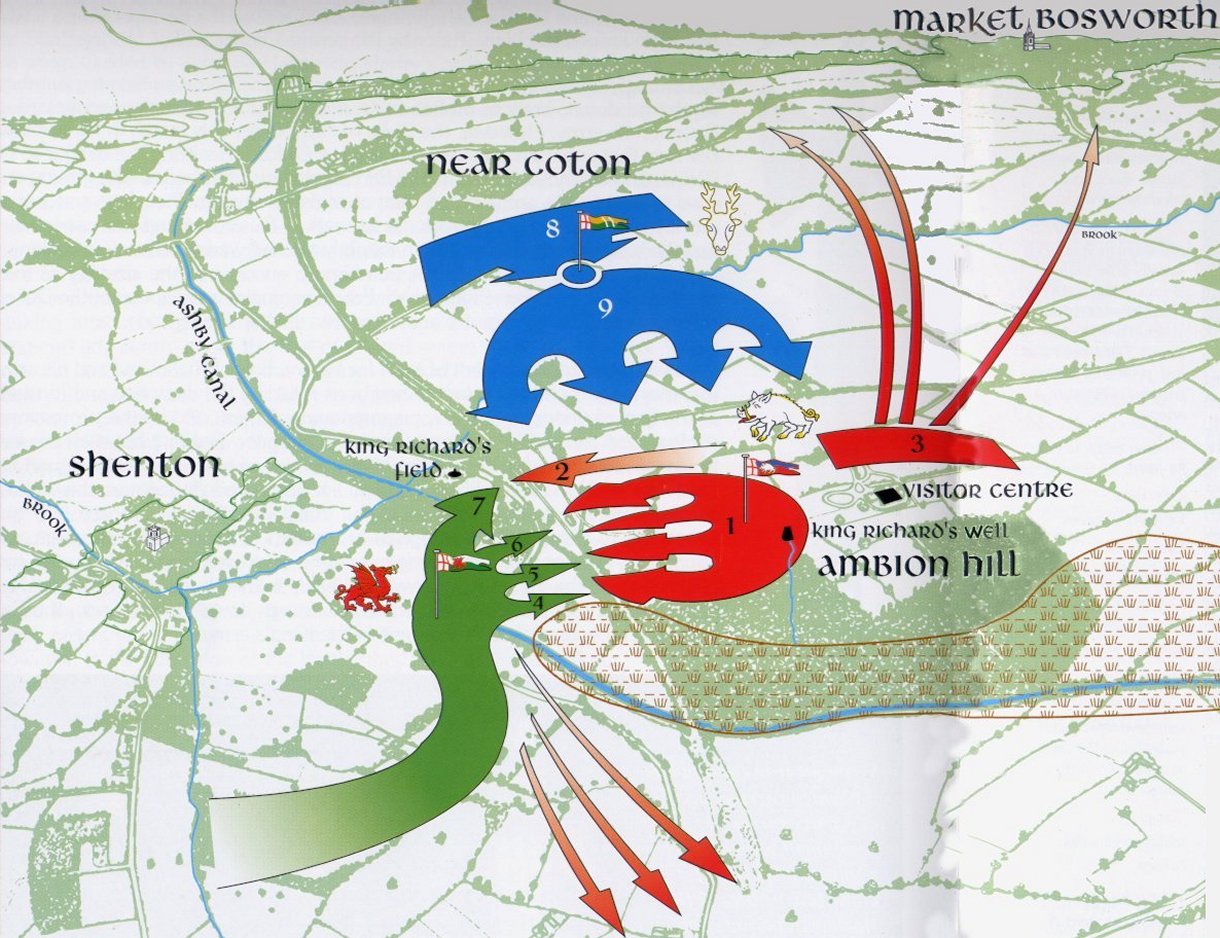
| |
|
Battle Positions
|
|
|
|
|
On the
morning of the battle, 22 August 1485, four armies
converged on a field south of Bosworth Market, 13
miles west of Leicester: Richard, numbering 12,000;
Henry, numbering 5,000; and two Stanley
armies, some 5,000 when combined.
Richard
had expected to have an even larger army. Richard
had called the lords of the realm to assemble under
his banner at Leicester on the 16th of August.
But many
of his vassals either failed to answer the royal summons
or conveniently got stuck in transit.
Nevertheless Richard was pleased to note his force
still greatly outnumbered his opponent. His
nightmares aside, Richard was quite confident of
victory as the battle began.
The
chief lords who did join their king were John
Howard, Duke of Norfolk, and Henry Percy, 4th Earl
of Northumberland.
John Howard
had been Richard's right hand man from the moment
Richard made his rise in 1483. Now here at
Bosworth, Howard was Richard's most trusted general. Norfolk commanded the Yorkist Vanguard to Richard's
right. The men under Richard's control had a deep, soupy marsh on
the
left to use as a defensive measure.
Henry Percy
was in the rear with 7,000 reserves. Richard had
a bad feeling about Percy. Richard had paid a
high price to win Percy's loyalty, but today this
man was worried about something.
Since Richard
had so many men, the field was not wide enough for
everyone to fight
at once. So he placed a considerable force in
reserve under Lord Northumberland. Just to be sure,
Richard placed a close watch on Percy when the
battle started. Richard didn't want Percy to
turn his own men on him. Richard was sick and
tired of people betraying him.
As
expected, the two Stanley armies moved into neutral
positions on a hill. They stood side by side
about half a mile apart.
|
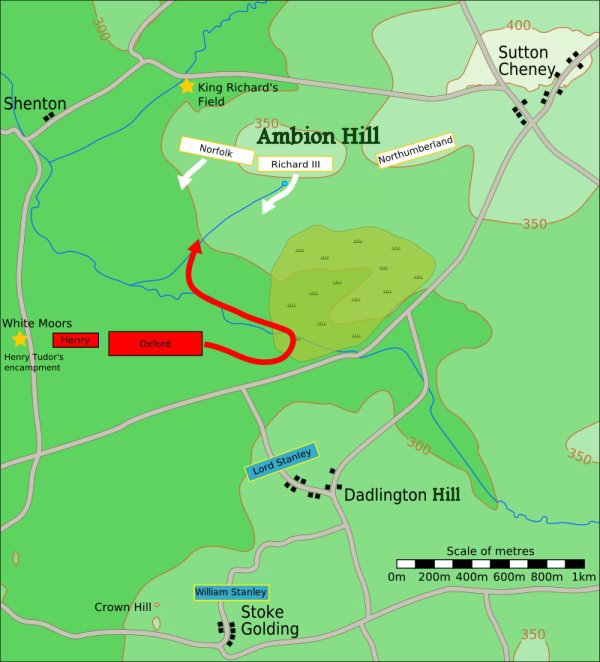 |
| |
|
Henry Tudor took the field with a
motley crew. Among his 5,000 men were roughly 1,000
French, 2,000 Welsh, 500 Scots, and 1,000 dispossessed Lancastrian exiles
plus a few York loyalists who
couldn't stand Richard. In other words,
Henry's army was comprised of everyone who hated the
Yorks plus everyone who hated the English... French, Welsh, and Scots.
Henry
was outnumbered 2 to 1. However, with half of
Richard's army held in reserve, the numbers were
roughly equal on the front line.
Henry was
well aware of his military shortcomings, so he put his friend John de Vere, Lord
Oxford, in charge of the planning. This was
Oxford's chance to redeem himself. Fourteen
years earlier, Oxford should have been the hero at the
1471 Battle of Barnet. Instead, Oxford had
lost
control of his men who decided to begin partying before the
battle was over. Amazingly, the vastly
superior Lancaster side lost the
battle. Warwick was killed and Edward IV regained
the throne. Given this shocking turn of
events, Lord Oxford's guilt must have been immense. Oxford
had disliked Yorkist King Edward, but he absolutely despised
King Richard. Oxford was burning to put this man
down once and for all.
Neither
Richard nor Henry moved to the front.
Henry, unsure of his fighting ability,
remained in back of Oxford's vanguard surrounded by
elite Welsh bodyguards. Richard
on the other hand was a warrior. He fully
intended to fight. However,
right now there were too many uncertainties... the Stanleys, Lord Northumberland, as well as Oxford's
initial strategy. Therefore Richard chose to stay up on the
hill where he could survey the situation.
Flanked by his own elite unit of mounted bodyguards,
Richard was content to let Norfolk take the lead.
The
battle unfolded when Oxford began advancing the Lancastrian
forces towards Ambion Hill in one body. His
right-wing was protected by the marsh. An exchange of
arrows and cannon fire followed. Richard had
more cannons, so Oxford decided to get closer to
Norfolk's men as the best protection from further
cannon shots.
|
| |
|
When
Richard saw Oxford advancing, he
ordered Norfolk to attack the enemy just after they
passed the marsh. Norfolk’s vanguard came down Ambion Hill
to
engage Oxford's force at the base. In the fierce melee that
followed, men hacked at each other in brutal
hand-to-hand combat using weapons such as the pole-axe,
hammer, battle axe, spear, mace, and long sword.
Norfolk's men were surprised when Oxford
suddenly moved his men into an
unusual V-shaped wedge. This wedge was a
favorite French offensive maneuver. During his
outlaw years, Oxford had
spent time fighting in France as a mercenary.
He
knew this formation well. In addition, his
cadre of French mercenaries was also quite familiar
with the technique. Hoping his opponent had
not studied recent French battle tactics, Oxford had
told these men in advance that he was planning to
use this maneuver.
Oxford placed two
banners in the ground, and encouraged his men to
form up between them in a V-shape. This created a solid
wedge of men similar to an arrow's point.
Norfolk had never seen this formation before. When Norfolk charged, he found
Oxford’s Wedge difficult to attack. Norfolk's
force was getting the worst of the melee, so Norfolk
risked his life trying to counter-attack. Bad
move. His risk failed and Norfolk was killed,
some say felled by Lord Oxford himself.
Richard had lost his best friend and finest ally.
|
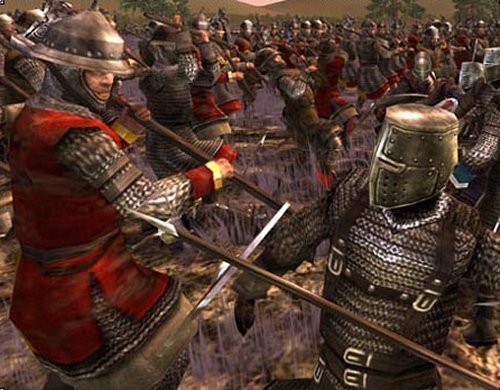 |
| |
|
Historian Chris Skidmore discusses Oxford's French
connection.
HENRY TUDOR'S SECRET WEAPON: THE FRENCH
With too few English men to fight in his army,
Tudor had been forced to recruit trained
mercenaries from Normandy to fight for him.
These French forces seem to have been experts in
military warfare, and were quickly able to
establish "by the king’s shot the lie of the
land and the order of his battle". The
Burgundian Chronicler Jean Molinet wrote how the
French troops, led by Philibert de Chandee -
whom Henry VII would later reward with the title
Earl of Bath - ordered for Tudor’s force to be
reassembled, and "in order to avoid the fire"
and instead to attack the right hand flank of
Richard’s vanguard, that seems to have caused
confusion in the royal army. Richard’s vanguard
was broken and soon dispersed and the French,
according to Molinet, "obtained the mastery of
his vanguard". A letter written by a French
soldier shortly after the battle, described how
Richard was heard crying “These French traitors
are today the cause of our realm’s ruin".
|
| |
|
Richard was aware that Norfolk had fallen. However, the
advantage of numbers was still with Richard and the Yorkists.
The problem for Richard was that Norfolk's battle lines
began to disintegrate without Norfolk's leadership. Richard ordered
Northumberland to bring up his reserve and join
Norfolk's hard-pressed men.
To
Richard's stupefaction, Lord Percy either did not
get the message or refused to participate.
Historians argue to this day whether this was
treachery or simply an inability of Percy to find
room to maneuver his force around Richard’s force or
around the marsh to the left. There are those
who suggest the Lord of Northumberland may have had
a pre-existing understanding with Lord Stanley (who
else?).
Percy's
men claimed unable to cross the marsh,
but Richard didn't believe a word of it.
He felt betrayed.
Given Richard's earlier suspicion, Richard concluded
'Treachery' was the more likely answer.
Whatever the reason, the reserve forces did not move
and Norfolk's line was about to collapse.
| |
Historian Chris Skidmore discusses the
reports of treason.
ABANDONED BY THE EARL OF
NORTHUMBERLAND
With the collapse of his vanguard,
Richard would have expected that his
rear-guard, led by Henry Percy, the earl
of Northumberland, to provide reinforcements.
Instead the earl did nothing. One
chronicler was insistent that "in the
place where the earl of Northumberland
was posted, with a large company of
reasonably good men, no engagement could
be discerned, and no battle blows given
or received". Northumberland, Jean
Molinet observed, should have "charged
the French" but instead "did nothing
except to flee, both he and his company,
and to abandon his King Richard" since
he had already agreed a secret pact with
Henry Tudor.
Northumberland was a northern lord whose
own power had diminished over the past
decade as a result of Richard’s rise to
power. He had nothing to lose and
everything to gain from abandoning his
king. Other reports from the battlefield
suggest that Northumberland may have not
only left Richard to his fate, but
actively turned against him and "left
his position and passed in front of the
king’s vanguard", at which point,
"turning his back on Earl Henry, he
began to fight fiercely against the
king’s van, and so did all the others
who had plighted their faith to Earl
Henry". If this were the case, it would
explain why Richard had been heard
"shouting again and again that he was
betrayed, and crying ‘Treason! Treason!
Treason!’"
|
| |
Things
were getting desperate. Oxford's men may have been out-numbered,
but they had more hate in them than his own men.
Plus they had the momentum thanks to that strange
wedge formation. The Wedge was pushing
Norfolk's men back towards Richard's men in the
rear. Something had to be done to bolster Norfolk’s flagging forces.
What was Richard to do? Norfolk's line
was floundering, Northumberland
stayed mysteriously rooted to the spot, and Stanley
continued to defy
his order. Realizing it was up to him to save
this battle, Richard mobilized his own force down
the hill to fill the breech.
Richard
watched in horror as the battle was in danger of getting away from him. Richard's eyes
automatically turned to the two Stanleys.
There they stood with their 5,000 men positioned on Dadlington Hill
less than a mile away. Richard was
infuriated. That damn Thomas Stanley!!
Why didn't he fight?
Incensed that Lord Stanley
still refused to participate, Richard
sent three messengers to Stanley with a curt and
quite frustrated demand... "Order your men to fight
now or watch your son die!"
15
minutes later the messengers were back.
Richard anxiously asked them what Stanley had said.
Lord Stanley's reply was so
unbelievable, it became instant military legend.
"Tell
Richard I have other sons."
Furious
at Stanley's defiance, Richard ordered his hostage, Lord Strange,
beheaded. However, in the heat and confusion of battle,
the order was not carried out... probably because no
one wanted to carry out the order. Whether
Richard won or lost, after the
battle, Lord Stanley would undoubtedly seek the
identity of the executioner and have his vengeance.
Since Richard was too busy to see if his order had
been carried out, Lord Strange was never touched.
Lord Stanley
never budged an inch throughout the battle.
|
| |
|
Richard's Charge
Henry
was feeling abandoned. Lord Stanley had
promised to help days earlier, but had yet to move.
This was bad news. Henry was still convinced
his army had no chance of victory against these
superior forces without Lord Stanley's help.
On the
other hand, he was encouraged by Oxford's
considerable success. Henry wasn't going to
give up without a fight. Seeing Richard's men
come down the hill about to attack Oxford, Henry
decided to advance his own men forward into the
battle to support Oxford's vulnerable right.
Henry moved his men to the right where there was an
opening between Oxford and the marsh.
Richard
could see that Henry was headed into the gap before
him. There were men fighting there, but
very few. No doubt Henry was moving to check the
advancement of the men Richard had recently sent
into battle. However, Henry had no idea
Richard was sitting right behind those men with his
own elite mounted guards.
|
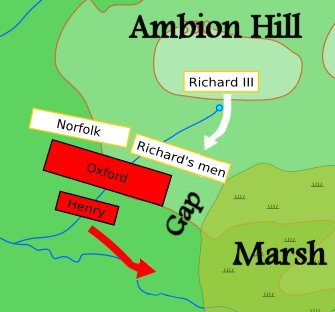 |
| |
|
Henry
was on foot with a relatively small force of men,
several hundred at best. Richard was
incredulous... Henry had no idea he had just exposed
himself to great danger. Richard tensed like a
panther ready to pounce upon an unsuspecting prey.
Richard
was certain he had just been given the chance to win outright
by killing Henry. This was the moment Richard
had been waiting for. He is said to have
uttered:
"God forbid I yield one step.
This is the day I will
die as a king or win."
With that, he ordered 200 men of his mounted
bodyguard
to charge.
The
horses came down the hill towards Henry at breakneck
speed. They penetrated through Richard's own
line, raced through the gap and took on Henry's
force directly.
As King Richard
and his mounted knights crashed into Henry’s
unit, their force was so great that Henry's men
barely withstood the initial onslaught.
|
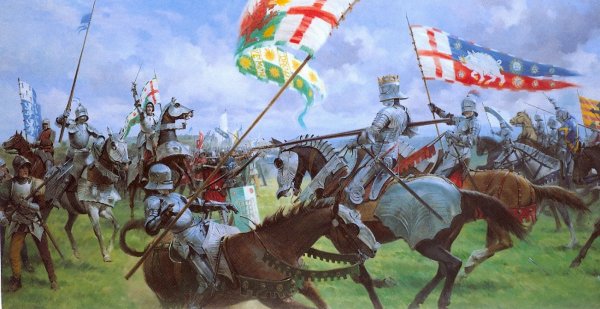 |
| |
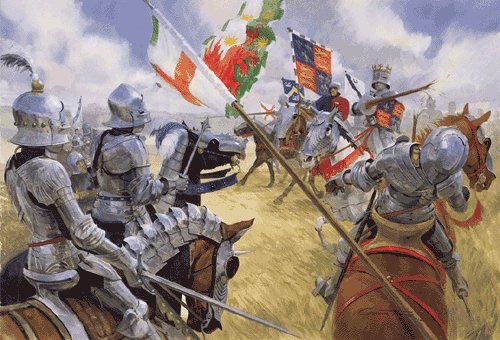 |
This was
an incredibly dramatic moment. In poker terms,
Richard was all in. He was risking everything
in a foolhardy attempt to take out Henry all by
himself. As
Shakespeare would put it, Richard had chosen to risk
his life on this cast of the die. Interesting
choice of words, yes??
Charging
recklessly at the head of his knights, Richard
reached Henry’s contingent first. Richard's lance struck
Sir William Brandon, Henry's
standard-bearer, in the
chest so hard that the lance broke in half. The powerful
thrust knocked Brandon
from his horse; the man was dead before he hit the
ground.
Riding
on, now Richard faced Sir John Cheyne, Henry’s
personal bodyguard. Cheyne was a huge man who was a renowned jousting champion.
Fearless, Richard unhorsed the giant using just the broken stub of his lance.
And then
it happened... Richard's horse was wounded.
In pain, the horse reared up and threw Richard to
the ground. Richard was down.
|
| |
|
 |
| |
|
Richard
was not hurt, but he was in great danger.
He was angry to see that Henry was still safe. Somehow Henry Tudor's Welshman had held firm against
the initial onslaught. They were still in
shock, but soon the Welsh bodyguards will begin to counter-attack.
Richard realized he had been far too impetuous in
his headlong charge. However, he still had time
to get away.
Henry's men had not regrouped sufficiently from the
wild charge. If Richard could find another
horse, he could flee and escape danger.
This was
the moment immortalized by William Shakespeare.
|
King
Richard:
A horse, a horse! My kingdom for a horse!
William Catesby (Richard's
councilor):
Withdraw, my lord! I'll help you to a horse.
King
Richard:
Slave! I have set my life upon a cast.
Now I will stand the hazard of the die.
Richard III, Act 5, scene 4,
7–10
|
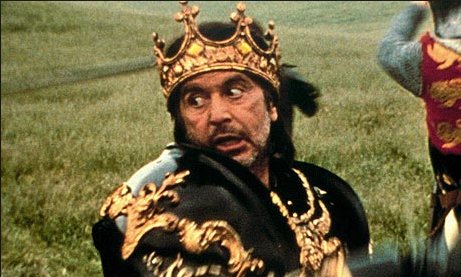 |
| |
|
After
Richard lost his horse, he bravely decided to stick
around. This was a bold move because now it was
Richard and his men who were out-numbered fighting
here behind enemy lines. Undeterred, Richard
rose and engaged several attackers by himself.
Observers of the action would later assert this was
Richard's finest moment. He fought off these
men single-handedly with great courage and skill.
In so doing, this bought Richard enough time for
help to arrive. Seeing their leader fall to
the ground, Richard's nearby men came to the rescue of
their leader. They regrouped around the king
to fight off Henry's men. This in turn gave
reinforcements coming from the marsh enough time to arrive.
Richard's foot soldiers had seen the mounted riders
race through the "Gap". Naturally they
had followed their leader who was fighting for his
life 300 yards downfield. Given time, the foot
soldiers had caught up to join the fight. This
was a major turning point.
Henry
was nearby and unsure what to do.
While Richard was an
undisputed warrior, Henry was
just the opposite. At
Bosworth, Henry waited on the sidelines and let others
do his dirty work for him. That
said,
to his credit, Henry did not
run. However, he was thinking about it.
Henry kept a horse nearby in case the battle was
lost. And right now it did not look good for
Henry.
Richard's one-man stand had evoked images of Henry
V, the great warrior king of Agincourt. His
maniacal fighting was infectious, evoking a passion
in the men which they had previously lacked.
Richard's men rallied around their indomitable
leader.
|
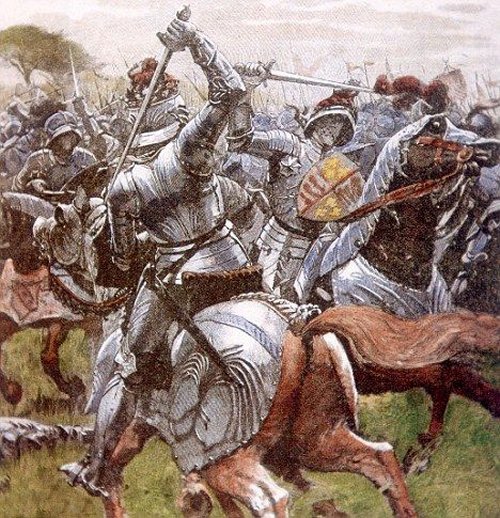 |
As for
Henry's forces, they sorely lacked leadership.
According to several sources, Henry did not even
swing his sword, but rather just stood there
cowering behind his Welsh guardsmen. Suddenly
out-numbered, Henry's meager force buckled.
Although Richard's wild charge had failed to reach
Henry, it had done a fine job of disorganizing
Henry's defense. The York foot soldiers
trailing the horsemen were on the verge of breaking
through the enemy line. Henry's men were
fighting for their lives.
Now that
the foot soldiers had joined the fight, it was just
a matter of time. Richard should have won
right here.
But he didn't.
|
| |
|
Instead
Richard was hit by a ferocious Sucker Punch.
When
Richard had made his mounted charge down the hill,
Stanley could see the horsemen making a determined
beeline for Henry's exposed right flank.
Realizing Henry was in serious trouble, Stanley
decided to intervene. He ordered his own men
to ride forward and cut off Richard's attack with a
surprise entry into the battle.
With Stanley's men coming in from behind with full
fury, Richard's men never knew what hit them.
It was a sneaky move, yet brilliant in its timing.
All's
fair in love and war...
Richard's men died swiftly, many of them with swords
in their backs. Others laid down their weapons
and surrendered. It was over.
Or
should we say it was over for everyone but Richard.
Unaware of Stanley's intervention, Richard was ‘fighting
manfully in the thickest press of his enemies.’
Richard
had been fighting so hard at the center, he had no
idea what was going on around him. However,
once his protective layer of men had been stripped
away, Richard suddenly became aware of the wolf pack
of men surrounding him.
With a
shudder, Richard saw their banner... these were
Stanley's men.
Seeing
that Richard was cornered, the wolves began to
approach. There
would be no escape. Richard had no choice but
to fight to his death.
|
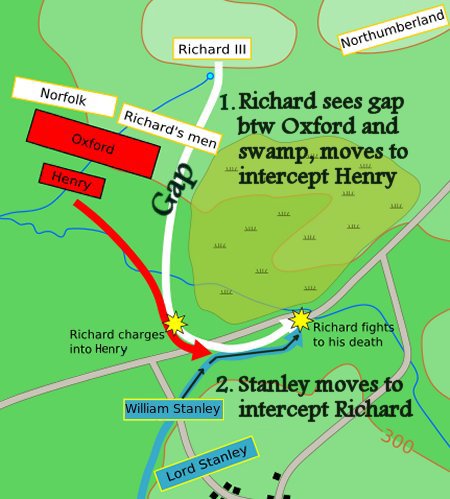 |
Richard's Final
Moments
(Rick Archer's Note: A woman named
Marilee Hanson wrote an eloquent passage about
the end of Richard's life. I was so
impressed that I prefer to give Ms. Hanson the
honor of finishing this part of the story.)
|
In the words
of Marilee Hanson:
Richard was wounded several times but
continually refused the advice of his few
companions to flee. He also refused
the offer of a horse. His heroism was
evident to all. In the end, Richard
could not prevail. Fighting alone,
Richard was virtually the last man standing.
Around him lay the bodies of his few
companions – Conyers, Brackenbury, Ratcliffe.
His crown was knocked from his head; his
head was struck so many times that his metal
helmet was beaten into the skull; even after
his death, his body continued to be beaten.
There is a legend that his crown landed in a
hawthorne bush; true or not, it was soon
enough in Henry Tudor’s hands – and not
because of any personal bravery on the part
of the first Tudor king.
It cannot be emphasized enough that Richard
III died valiantly in battle.
The battle lasted about two hours. Its
outcome – Henry’s triumph – was only made
possible by Stanley’s disgraceful betrayal
of his king. Had he waited a few
moments longer, Henry may have been
personally killed by Richard. That single
action inaugurated the Tudor dynasty – and
it was a shameful inauguration.
Richard III, who had fought so heroically
and suffered an awful death, continued to be
humiliated and abused. His body was
stripped of armor and underclothes.
Then his naked body was slung limply over a
horse with arms and legs dangling at the
sides. A halter was tossed around his
neck to symbolize his defeat. In this
shameful manner, Richard was taken to a
friary in Leicester where his body lay on
view for two days; it was naked from the
waist down except for a scant and cheap
black cloth.
|
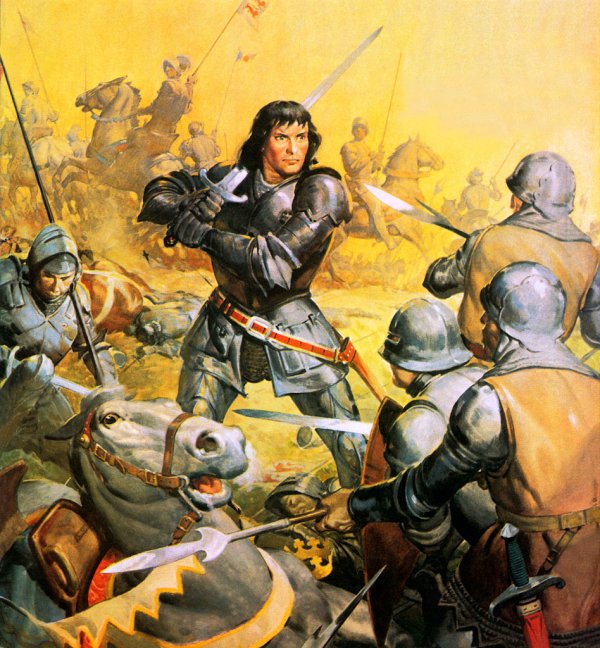 |
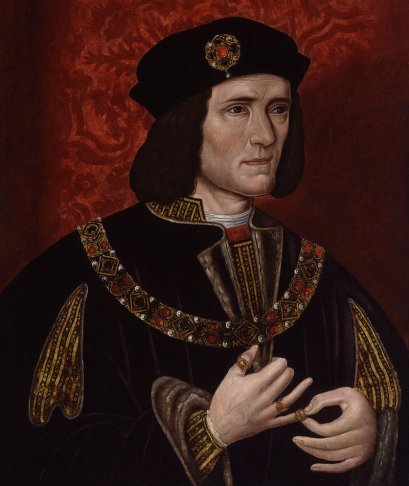 |
Richard was buried at the friary with no
ceremony in a pauper's grave. The church no longer exists
– Henry’s son ordered the dissolution of the
monasteries in the 1530s. Richard’s grave
was opened and the body thrown out. Later,
the coffin was supposedly used as a horse
trough and cellar steps in a nearby manor.
Richard III remains the only English king
since 1066 to have no burial place. He
was also the last English king to die in
battle.
Henry Tudor had declared himself King Henry
VII after Lord Stanley placed Richard’s crown
upon his stepson’s head. His officers were
busy settling old scores, executing old foes
and rounding up the prisoners. In the end,
we can reasonably estimate that about 400
men – in total – died that day. Few wanted to talk about the actual fighting
after the battle. Those two hours
ended in betrayal and death for one king and
started one of the most celebrated dynasties
in English history.
On a personal note…. I
do want to stress that Henry Tudor did not
participate in the fighting – and, in fact,
he kept a horse nearby so he could flee if
the battle was lost. In other words,
Henry planned to ‘turn tail and run’, as the
cliché goes.
It might seem odd that a king who supposedly
won his crown in battle was actually quite
cowardly on the battlefield, and didn’t
participate – but it is the truth. Richard
III only lost because Lord Stanley
disgracefully betrayed his king. And he did
so after Richard had already forgiven him
numerous offenses (many bordering on
treason), and had treated him kindly. Henry
may have claimed a crown that day, but he
claimed no glory.
If you wish, you may visit the Richard
III Society site for the other side
of the story.
|
|
Kill Shot
After
Richard had been knocked off his horse, he wandered
the battlefield looking for Henry. He killed every man coming into his
way with fatalistic rage. Then Richard spotted
Henry a hundred yards away. Henry was clearly
visible beneath his banner. Richard sniffed
with disgust at Henry hiding behind the Welsh
bodyguards
battling to keep him alive. Full of scorn,
Richard decided to finish the issue himself.
Full of battle fury, Richard drew his
battle axe and moved stealthily towards Henry.
Although Richard was in the absolute thick of the
battle, he still wore his crown. Knowing full
well this made him a marked man, to his credit,
Richard refused to take it off.
Suddenly
a large group of men appeared out of nowhere to
block his path.
Richard was confused. He had nearly reached
Henry when this
sudden press of new attackers forced him to abandon
his path. Richard realized that he and his knights were
being driven back into the
marshy ground by a much-superior force.
With
Richard did not know was that William Stanley had
been watching the battle from his armchair seat on
the side of the battlefield.
Seeing the great peril that Henry was in, William
Stanley had launched his men into action on the
Tudor side.
Stanley's rescue almost didn't make it. In addition
to Richard's approach, there were other fighters on
the verge of breaking past Henry's tiring
bodyguards. Stanley's men arrived just in the
nick of time. Now Henry's imminent demise changed in
the blink of an eyelash as Stanley's men descended
with brutal effectiveness.
|
| |
Richard's men never knew what hit
them.
Shortly
after Stanley's men charged into the flank of
Richard’s household knights, Richard realized he was
surrounded. Where did these new men come from?
They were not here a moment ago. Then Richard
saw their banner and froze. These were
Stanley's men. Richard knew he was doomed.
Screaming “Treason!”, Richard hacked left and
right with his battle axe. So did his
remaining coterie.
Outnumbered, Richard's group fought valiantly but
were cut down one by one.
Now it
was just Richard. As the wolf pack approached,
Richard prepared to die a soldier's death. The
blows came from every direction. An arrowhead
was found embedded in his spine. It was this wound,
inflicted by an enemy archer at close range, that
most likely brought the battling King to his knees.
Richard
suffered 10 deep wounds. The kill
shot was a blow deep into the back of Richard's head by a
halberd. The blow was so strong it cleaved a
giant hole into his skull and left chips of his
metal helmet buried in his brain. This deep
gash would serve as a gruesome testament to the horror of
Richard's last fight.
|
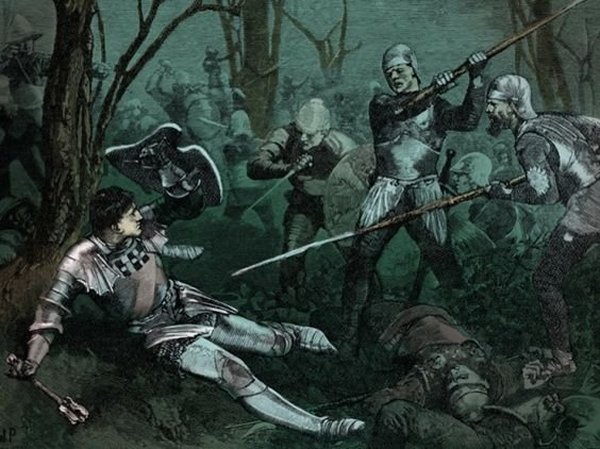 |
| |
|
Richard
was the final Plantagenet King of England. He
was also the last English king to die in battle.
Every
observer, sympathetic or otherwise, agreed that Richard
had
fought bravely to the end.
John Rous,
a man who compared Richard
to the Antichrist, admitted, “If
I may say the truth to his credit, though small in
body and feeble of limb, Richard
bore himself like a gallant knight and acted with
distinction as his own champion until his last
breath.”
|
|
|
|
Shortly
after Richard's death, Lord Stanley appeared at the
site. As Stanley stood there viewing Richard's
lifeless body, a courtier named Reginald Bray
noticed Richard's crown had fallen into a nearby
hawthorn bush.
Stanley
asked Bray to hand the crown to him. Then
Stanley turned towards Henry and placed the crown on
his son-in-law's head. Then Stanley stepped
back and took a knee. Everyone in attendance
grasped the solemnity of the moment and did the
same.
Lord Stanley
saluted him as king, while the soldiers shouted for
'King Henry!'
There on the battlefield, Henry Tudor was crowned as Henry VII.
To the
winners and traitors go the spoils. Henry Percy, Earl of
Northumberland, the man who withheld 7,000 men from
Richard, was taken prisoner. He did not
suffer for long. Henry Tudor, now King Henry
VII, soon released
the last Percy heir
from the Tower of London.
Henry appointed him Lord Warden of the East
and Middle Marches, thereby
generously rewarding Percy's treachery and perhaps
pointing to a possible secret deal made by Percy and
Lord Stanley beforehand.
Henry
also rewarded
Thomas Stanley, his “right
dearly beloved father”. Henry made Stanley the Earl of Derby
on 27 October 1485. The following year Henry confirmed
Stanley as Lord High Constable of England and
High Steward of the Duchy of Lancaster, besides
granting him other estates and offices. In 1486
Stanley also stood as godfather to Henry’s eldest
son, Arthur, Prince of Wales.
Lord
Stanley had elevated fence-sitting to an art form.
One can only wonder how his son Lord Strange felt towards his
father for offering him up as a lowly pawn.
John Howard,
Duke of Norfolk, was virtually the only person who did not desert Richard that day.
Howard was rewarded for his loyalty with a arrow
through his face after his helmet was pulled off during the battle.
Curiously, Shakespeare wrote in his play that
Norfolk had been warned the night to be very
careful. This warning was attached as a note
to his tent.
'Jack of Norfolk be not too bold for Dickon, thy
master, is bought and sold'
'Dickon',
of course, is slang for Richard. Legend has it
that Northumberland had been bought off by Lord
Stanley prior to battle. If so, Treachery
indeed.
|
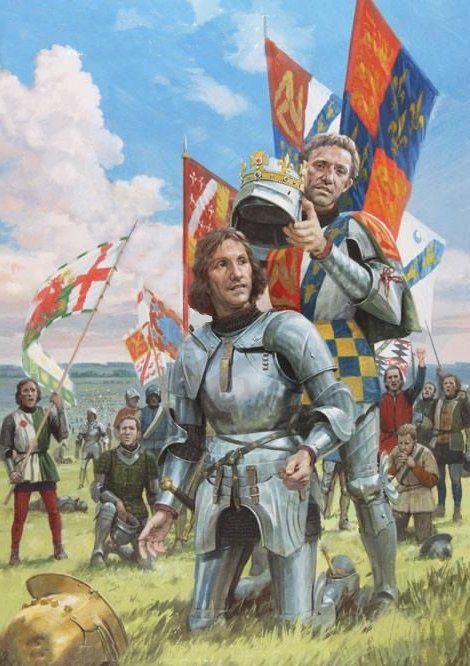 |
| |
|
King Henry VII
|
| |
|
Henry
Tudor became king of England at the age of
twenty-eight. His
mother Margaret burst into
a flood of tears at his coronation.
Henry VII did indeed marry Elizabeth of York, a
union which put a welcome end to the War of the
Roses. During Henry's reign, playing
cards were invented. The portrait of
Elizabeth has appeared eight times on every pack of
cards for the last 600 years.
Although
Henry was not a particularly popular king, he did
have his virtues. For one thing, Henry proved
to be an able administrator. He was also
extremely frugal, 'miserly', a trait which restored England to
financial security.
One of
Henry's wisest moves was to forbid nobles to retain
their own armies. After observing how his
step-father Thomas Stanley had held both Richard and
himself hostage to his power, Henry learned his
lesson. From now on, a small number of
attendants was acceptable, but Henry did not want
any lord to have more power than the king.
Edward IV had attempted the same maneuver, but had
not gotten very far. Henry did much better.
He was aided by a simple fact... as king, he owned
most of the gunpowder in the country. Henry simply blew up the castle of any
recalcitrant baron. It was a very effective policy.
In general the English nobility was already in
decline thanks to the decimation during the Wars of
the Roses. Under Henry, the power of the
nobility fell even further while the King grew in
power.
It is
said that Henry lacked the majesty and charisma of
his son Henry VIII and his famous granddaughter
Elizabeth I. But maybe charisma was not
important during those years. Henry was better
known as a plodder. His attention to detail, hard work, dedication, and discipline was exactly what
England needed.
Henry
VII was succeeded by his son, the tyrannical and
bloodstained Henry VIII. Henry VIII is
probably the best-known king in English history, but
for all the wrong reasons. Henry VIII was
famous for marrying six wives and executing two of
them. His problems with the Catholic Church
would lead to much bloodshed and heartache in years
to come. Henry VIII gave us
Bloody Mary, the fanatic
Queen who burned Protestants at the stake in her
Catholic zeal.
On the
other hand, Henry VIII also gave us Elizabeth I by
Anne Boleyn.
Elizabeth
was said to be wily and
highly astute.
She had to be! Elizabeth survived an
appalling childhood and adolescence to emerge as the
ablest of the Tudors.
Elizabeth nimbly
survived the many
assassination attempts made on her life.
Coming to power as a
Protestant at a time when the Catholic Church was fighting
to retain religious supremacy in England, Pope Pius V issued
a proclamation giving any Catholic the green light to rise
up and assassinate her.
Elizabeth’s life was in
constant danger after that. There was the Barge Incident,
the Ridolfi Plot, the Throgmorton Plot, and of course the
infamous Babington Plot, the one that would cost Mary, Queen
of Scots, her life.
In December 1583, Elizabeth wrote to the French Ambassador:
“There
are more than two hundred men of all ages who, at the
instigation of the Jesuits, conspire to kill me.”
Queen Elizabeth was not
exaggerating. However, she escaped
every single attempt on her life unscathed. It seems
evident that Elizabeth I shared many qualities with her
grandfather, Henry VII, the first Tudor king. Both were
shaped by perilous upbringings to become cautious,
careful rulers who trusted their own instincts over their
advisors. This distrust served them in good stead.
Elizabeth went on to lead
England for 45 years. Elizabeth was a
remarkable woman who was noted for her learning and wisdom.
She
was popular with the people of England and had a knack for
selecting capable advisors. Unlike many rulers, the
welfare of her people was her main objective.
Elizabeth oversaw the
expansion of England's sea power. The Spanish Armada was
decisively defeated in 1588 and Raleigh's first colony in
Virginia was founded. With Shakespeare at the
height of his popularity, prosperity at home, and dominance
in foreign relations,
the
Elizabethan Era
became a celebrated time in
English
history. When my friends and
I visit the Texas Renaissance
Festival every fall, we are reenacting the
classic 16th
century of England.
Alas, Elizabeth chose never
to marry, so she was the
last of
the Tudor monarchs.
With no offspring to take her place, Elizabeth
gave tacit approval to the appointment of James, son of
Mary, Queen of Scots, to take her place. With Elizabeth's
death, the House of Tudor (1485-1603) came to an end.
The new King James took the
throne largely because James was about
the only man left with a drop of royal blood. Oddly
enough, Elizabeth had executed the young
man's mother, Mary, Queen of Scots.
Then she turned around and made Mary's son the next English
king. Weird? No kidding. That is why I love English history so much.
English history is so deliciously
perverse and unpredictable.
|
 |
Elizabeth
Woodville Revisited
There is
an excellent chance that the real Elizabeth
Woodville wasn't nearly as nice and decent as the
woman portrayed in the White Queen.
There are hints she was a schemer in her own right.
However, that side of her got short-shrift in the TV
series. We are all so much at the mercy of how
the script writers wish to portray each character.
Ostensibly the White Queen
was a tale about an unusually pretty girl who waylaid a
King by the roadside. After Elizabeth used her magic ways to
capture Edward's fickle heart, she was in for a wild
ride. Such a
scandal! For a king to marry a widow (i.e. not a virgin),
a commoner once married to the enemy, a woman 5
years older than the King, this was unheard of.
For this coup alone, Elizabeth Woodville would go
down in history as a woman best known for marrying
well above her station and brilliantly capitalizing
on it.
The
legacy of Elizabeth Woodville is quite impressive.
Considered an 'unsuitable woman' for the throne, she gave birth to
twelve
children!! Together Edward and Elizabeth had 3 boys and
7 girls (5 of whom lived to adulthood).
Unfortunately, Elizabeth Woodville would suffer much
heartache in the process. Sad to
say, three of her five sons were likely murdered by Richard
III. One died young and one by her first
husband survived.
The
match brought his Queen and her family right into
the thick of the Wars of the Roses.
Over the next twenty-four
years, Elizabeth would experience five changes in
leadership, ten children, five uprisings, god
knows how many battles, two missing Princes and a
slew of dead relatives. Despite intense
heartache, in the end, Elizabeth had the satisfaction
of knowing her namesake daughter would become
the next Queen of England. Every
monarch that has sat on the throne from Henry VIII
onwards has been her descendant.
|
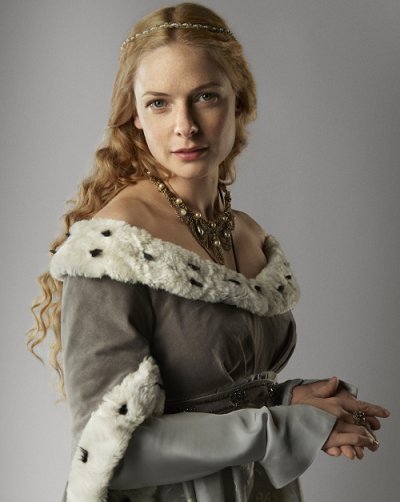 |
On a
personal note, the main reason I wrote this long
story about the War of the Roses was
to learn more about Lord Stanley.
Quite frankly, I doubt there would have been a Tudor
Dynasty without Lord Stanley. I also doubt
very many people know who he was.
And yet
look how remarkable Stanley was!! In a story
dominated by fearsome warlords such as the Duke of
York, the Earl of Warwick, George Plantagenet, the
Duke of Birmingham, Margaret of Anjou, Edmund
Beaufort, Henry Percy, Richard III, there was one
man - Lord Stanley - who stayed completely unscathed
for the entire 32 years.
I
certainly had no idea how important Stanley was
until I saw the White Queen series on
television.
But the
funny thing is, although the show was supposedly
about Elizabeth, somewhere along the line Margaret
Beaufort stole the show. And in many ways Lord Stanley
stole the show from her.
To me,
Lord Stanley was by far the most interesting
character in the entire series. Lord Stanley
was responsible for the most remarkable quote I
think I have ever heard.
In the tenth
and final episode, when Stanley replied to Richard,
"I have other sons", I practically fell out
of my chair.
Who on
earth takes chances like this with his son's head on the line? At the time, I told
myself if I ever got the chance to learn more about
this strange man named Lord Stanley, I would do so.
Even though I spent over seven long weeks researching the
story, I am so glad I followed through with my
initial curiosity.
I have
long been intrigued with the Game of Thrones.
However, as twisted as this series has been, I
always told myself that this was fiction and nothing
this crazy could ever happen in real life. And
then I discovered the War of the Roses!
The War
of the Roses has seen a plethora of family feuding,
incest, crimes of passion, tragedy and acts
of cruelty that would stretch the imaginations of
even today’s most far-fetched soap opera writers.
Although Shakespeare's interest settled upon
Richard III, my interest fixated upon Lord
Stanley, the shrewdest of them all.
I am
more used to men like Warwick, or Richard of York,
or Margaret of Anjou, or Edward of York... men who
use war and power to further their interests.
Unless Lord Stanley did murder the Princes in the
Tower (unlikely according to the experts), I don't
remember Lord Stanley dropping a single drop of
blood outside of battle. Stanley gained his
power strictly through one daring chess move after
another.
Unlike the ruthless Richard III or serial traitor
Lord Warwick, Lord Stanley grew rich by clever
marriage and clever politics. Unlike the
others who died horrible deaths in pursuit of the
throne, Stanley advanced because he was perfectly
happy being the power behind the throne. He
raked in titles, lands, riches, and accolades
without aspiring to have his face on the money.
Or should we say both faces on either
side of the coin?
It was so perfectly fitting that
Lord Stanley, despite his earlier absence
at Bosworth,
was conveniently on hand to pick up Richard’s fallen
crown and place it on the head of the new king,
Henry VII.
Lord Stanley died at his estate of Lathom House in
Lancashire on 20 July
1504. Considering all the
dramatic chances he took throughout the Wars
of the Roses, Stanley was
fortunate to have died naturally at home, instead of
on a battlefield or on the scaffold.
It
had taken great skill not just to stay alive,
but to have enriched himself and his family in the
process. Expediency
was his watchword.
No
monarch however powerful
could ever completely rely on his loyalty or
support. Lord Stanley’s allegiances were
ever ready to shift in the winds of change,
his sails
always ready to altered and adjusted if the
situation demanded it.
At its heart,
the War of the Roses is a story about treachery and
double cross. Time after time,
people are always worse than
one can ever imagine
them being. Or so History would apparently teach
us. The War of the Roses showed
us what happens to people whose morals fall to
pieces when their ambition places them too close the
throne. As they say, power corrupts. And
so does ambition.
We watched
carefully as one shark after bit the dust.
Warwick, Margaret of Anjou, George, Edmund Beaufort,
Richard, Anne Neville, Isabel Neville, Edward of
Westminster, and all those French kings.
Elizabeth trusted no one, but she was helpless to
protect her children. Richard bestowed lands,
titles, honors right and left and look how much
loyalty that bought him. Margaret Beaufort
played the
angles and prayed till she was blue in the face, but
in the end found herself was helpless to win the
battle for her boy. Ultimately it wasn't
Margaret, but rather Stanley who put Henry VII on
the throne. Stanley played the game the best.
There is
a board game known as Diplomacy that I
have played over the years. By coincidence, it
has spots for seven players. I have observed
that the winner is typically the one who irritates
the fewest people in the early stages of the game
and who backstabs an ally at a critical juncture
late in the game. I personally am not fond of
backstabbing, so I don't win very often. But I
know how it's done.
More
than any character I have ever studied, Thomas
Stanley has produced a master class in how to
navigate one's way through tricky, dangerous situations with
head intact. His knack for treachery is a lesson for
the ages.
|
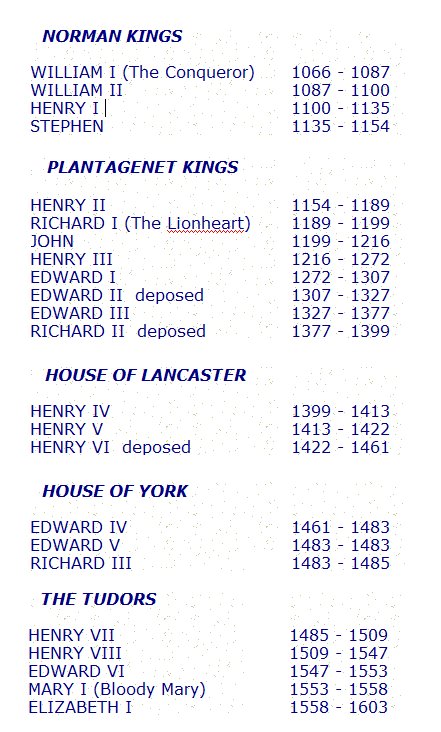
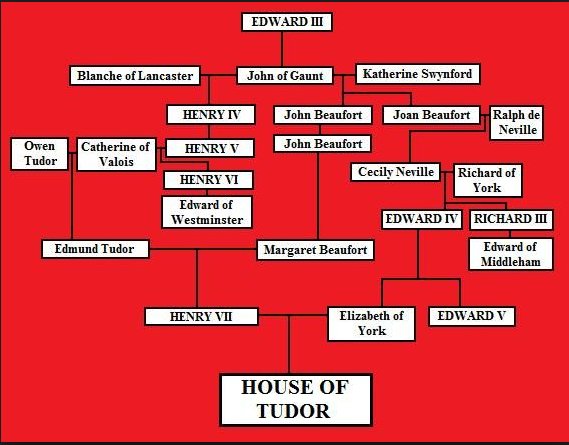
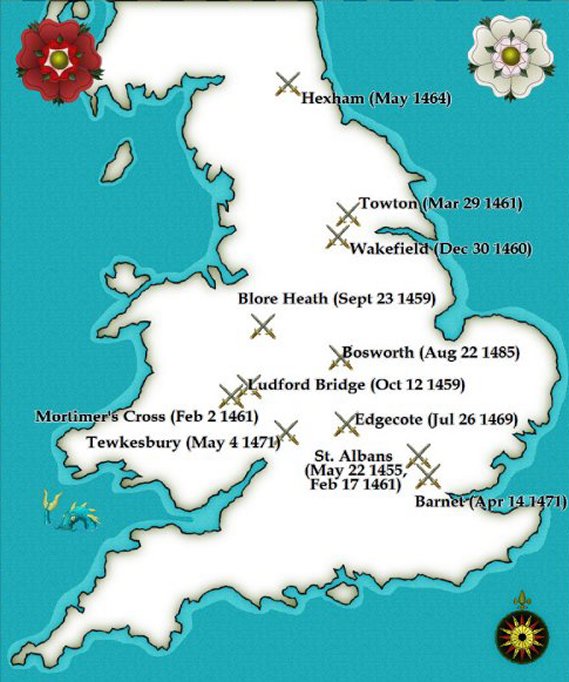 |
Ordinarily our
story should end here. Henry has defeated Richard III
and would go on to marry Elizabeth of York the following
year.
However, the
tale of Richard III had the strangest second Act of any
story in history. You see, not only did the ghost of
Richard come back to haunt England, so did the entire Battle
of Bosworth.
|
|
|